The 3 Rooms Of Melancholia
Pirjo Honkasalo / Melancholian 3 huonetta / Finland / 2004 / 85 min / Russian & Chechen & Arabic & Finnish
A military school in Saint Petersburg, civilians in Grozny, a refugee camp in Ingushetia. Children in post-Soviet space.
November 10. 18.00, Toldi mozi
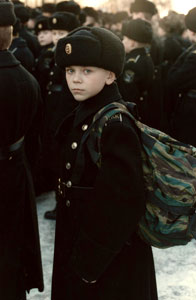 This poetic and very sophisticated documentary is divided into three chapters, in
three Rooms. In each of them, the atmosphere is determined by one predominant
emotion. With very few words but with lots of eloquent cinematic means, the film
speaks about basic emotional and mental states. In the first Room, we follow young
boys, obedient cadets at a military school in St. Petersburg. These children of thirteen
or fourteen are not here by choice: most of them come from dysfunctional families.
Just by observing their morning rituals, the school's rigid discipline and their
way of interacting, one gets a notion of their enormous solitude. One of the boys
shifts the story to the second Room - Breathing - where we witness the doomed
lives of the people of Grozny. The last Room - Remembering - crosses the Chechen
border into the neighbouring province of Ingushetia, where people fight out their own
tragedy. With a keen eye for detail, especially human faces, and with precise timing,
the director successfully creates remarkable, emotionally loaded scenes.
This poetic and very sophisticated documentary is divided into three chapters, in
three Rooms. In each of them, the atmosphere is determined by one predominant
emotion. With very few words but with lots of eloquent cinematic means, the film
speaks about basic emotional and mental states. In the first Room, we follow young
boys, obedient cadets at a military school in St. Petersburg. These children of thirteen
or fourteen are not here by choice: most of them come from dysfunctional families.
Just by observing their morning rituals, the school's rigid discipline and their
way of interacting, one gets a notion of their enormous solitude. One of the boys
shifts the story to the second Room - Breathing - where we witness the doomed
lives of the people of Grozny. The last Room - Remembering - crosses the Chechen
border into the neighbouring province of Ingushetia, where people fight out their own
tragedy. With a keen eye for detail, especially human faces, and with precise timing,
the director successfully creates remarkable, emotionally loaded scenes.
producers: Kristina Pervilä / Millennium Film
co-producer: Pirjo Honkasalo / Baabeli
screenplay: Pirjo Honkasalo
camera: Pirjo Honkasalo
editor: Niels Pagh Anderson, Pirjo Honkasalo
music: Sanna Salmenkallio
festival info:
The Human Rights Film Network Award, The Lina Mangiacapre Award, EIUC Special Mention - Mostra Intrenazionale d'Arte Cinematografica, Venice, Italy, 2004 / First prize (shared) - cph:dox Documentary Film Festival, Copenhagen, Denmark, 2004 / Amnesty International Award - IDFA, Amsterdam, The Netherlands, 2004 / Grand Prix - Zagreb Dox International Documentary Film Festival, 2005 / Vera Prize - 8th Annual Documentary and Short Film Festival Vera, Aland, Finland, 2005 / Main Prize in Finnish Competition - Tampere International Short Film Festival, 2005 / ACTA Prize by Signis, Fuena Prize "Visión Artistica" - Festival Internacional de Cine del Mar del Plata, 2005 / FIPRESCI Award - Thessaloniki Documentary Film Festival, Images of the 21st Century, Greece, 2005 / Seeds of War Award - Full Frame Documentary Film Festival, NC, USA, 2005 / Special Mention in category Best International Film - DocAviv, Tel Aviv International Documentary Film Festival, Israel, 2005 / Arie & Bozena Zweig Innovation Award - Chicago International Documentary Festival, 2005 / Best Director Award - One World Human Rights Documentary Film Festival, Prague, Czech Republic, 2005 / Grand Prix - 19th Pärnu International Documentary and Anthropology Film Festival, Estonia, 2005 / Grand Prix Golden Apricot for Best Documentary Film - Golden Apricot International Film Festival, Yerevan, Armenia, 2005 / Special Mention for Documentary Film - ANONIMUL International Film Festival, Romania, 2005 / First Prize - VII Festival Internacional De Cine y Video / Derechos Humanos, DerHumALC, Santiago del Estero, Argentine, 2005 / Prix Italia TV Documentaries (Current Affairs) - Prix Italia, Milan, Italy, 2005 / Eurodok Award 2006
production and sales info:
Millennium Film Oy
Koskikartanontie 12
75530 Nurmes
Tel. +358 13 -5110 100
Fax. +358 13- 5110 111
millennium@millenniumfilm.fi
kristiina.pervila@millenniumfilm.fi
www.millenniumfilm.fi
filmography:
Arento, 1968 / Their Age, 1976 / The Sign of Danger, 1978 / Two Forces, 1979 / Flame Top, 1980 / 250
Grams, 1983 / Da Capo, 1985 / Leonardo's Windows, 1986 / Mysterion, 1991 / Tanjuska and the Seven
Devils, 1993 / The Cinderella of Tallinn, 1995 / Atman, 1996 / Fire-Eater, 1998 / Darkness, 2000
The Angelmakers
Astrid Bussink / The Netherlands & Scotland & Hungary / 2005 / 34 min / Hungarian
Stories of arsenic murders from fragments of memories. The women of Tiszazug poisoned their husbands, fathers-in-law and children: 162 victims in all.
November 11. 16.00, Toldi mozi
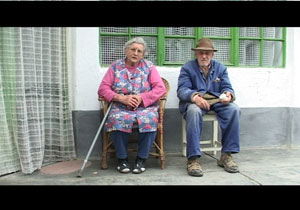 A small village in the Hungarian countryside appears to have a dubious past: in
1929, a series of arsenic murders was exposed here, and 51 women were arrested
on suspicion of poisoning their husbands and relatives. The arsenic they used had
apparently been taken from flypaper. In total, there were 140 cases of murder, for
which many women went to prison. Besides a reconstruction of the killings, this
film is a portrait of the present inhabitants of Nagyrév, who all remember something
different about the murders. They also muse about the current exodus from
the village, are worried about a melon theft and complain that life in the village is
boring: there is no cinema or aerobics club. The desolation and isolation of the
village is captured quietly and carefully: a stooped man shuffles past, a house
stands empty on the edge of the village. The director filmed at the kitchen table,
on the ferry and on a bench in front of a house, where an elderly couple recalls
how they got married within two months of meeting one another: "He needed
someone to mend the fishing nets."
A small village in the Hungarian countryside appears to have a dubious past: in
1929, a series of arsenic murders was exposed here, and 51 women were arrested
on suspicion of poisoning their husbands and relatives. The arsenic they used had
apparently been taken from flypaper. In total, there were 140 cases of murder, for
which many women went to prison. Besides a reconstruction of the killings, this
film is a portrait of the present inhabitants of Nagyrév, who all remember something
different about the murders. They also muse about the current exodus from
the village, are worried about a melon theft and complain that life in the village is
boring: there is no cinema or aerobics club. The desolation and isolation of the
village is captured quietly and carefully: a stooped man shuffles past, a house
stands empty on the edge of the village. The director filmed at the kitchen table,
on the ferry and on a bench in front of a house, where an elderly couple recalls
how they got married within two months of meeting one another: "He needed
someone to mend the fishing nets."
producer: Astrid Bussink
screenplay: Astrid Bussink
camera: Klára Trencsényi
editor: Brigitta Peszleg, Astrid Bussink
music: Jan Schaten
festival info:
First Appearance Award - International Documentary Film Festival Amsterdam 2005 / Trieste Film festival, Italy, 2006 / Hungarian Filmweek, Budapest, Hungary, 2006 / Little Stamp Award -Zagrebdox, Zagreb, Croatia, 2006 / Cinéma du Réel, Paris, France, 2006 / Doclab Arhus Filmvarksted, Arhus, Denmark, 2006 / Best Documentary Short - ECU European Indep. Film Festival, Paris, France, 2006 / Full Frame Film Festival, North-Carolina, USA, 2006 / Women's Film Festival, Seoul, South Korea, 2006 / 53rd Belgrade Documentary & Short Film Festival, Belgrade, Serbia & Monte Negro, 2006 / Prix du Jury regards sur le Crime - Vision du Réel, International Film festival Nyon, Switzerland, 2006 / Mediawave 'Another Connection ' International Film Festival, Győr, Hungary, 2006 / Tekfestival Rome, Italy, 2006 / Raccontare il Vero 3°international Documentary Review, Parma, Italy, 2006 / GUTH GAFA, Donegal Documentary Film Festival, Ireland, 2006 / Spectrum Young Talent, Cologne, Germany, 2006 / Cyprus Documentary Festival, Plataniskia Cyprus, 2006 / Dokufest, Prizren, Kosovo, 2006 / 60th Edinburgh International Film Festival, Edinburgh, UK, 2006
production info:
co-production of ECA (Edinburgh) and SZFE (Budapest)
Edinburgh College of Art
Lauriston Place
Edinburgh
EH3 9DF
Tel: + 0131 221 6000
Színház- és Filmművészeti Egyetem
Vas u. 2/c
1088, Budapest, Hungary
Tel: + 361 318 8111
sales info:
Astrid Bussink
6 2f2 Lauriston Gardens EH39 HJ Edinburgh, UK
info@angelmakers.nl
filmography:
Upside Down, 2006
Before Flying Back To Earth
Arunas Matelis /Prieš parskrendanti Žemę / Lithuania & Germany / 2005 / 52 min / Lithuanian
One practices karate and dreams of hamburgers and Coke. The other records the images that surround him. Pipes, tubes, a sterile room - children with leukemia.
November 9. 18.00, Toldi mozi
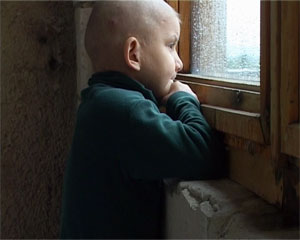 After his daughter survived eight months of treatment for leukaemia, the Lithuanian
filmmaker Arunas Matelis did not turn his back on the hospital. He filmed the kids
in the leukaemia ward in Vilnius during their day-to-day routine, without becoming
sentimental. For the parents, their worst nightmare has come true, but what do the
children themselves think? A life among medicine and tubes does not prevent them
from just carrying on. Their adaptability is incredible. The children practise karate or
dream of getting hamburgers and Coke instead of the same old cabbage soup.
The future is often brought up, as if it were not finite: they hope they will not turn
blond when their hair grows back, or they want to become a doctor, "but not in the
leukaemia ward." Before Flying Back to the Earth is interlaced with black-and-white
pictures showing the children in the middle of a smile, yawn or gesture,
momentarily freezing time in this thorough documentary that does not deal with
death, but with life.
After his daughter survived eight months of treatment for leukaemia, the Lithuanian
filmmaker Arunas Matelis did not turn his back on the hospital. He filmed the kids
in the leukaemia ward in Vilnius during their day-to-day routine, without becoming
sentimental. For the parents, their worst nightmare has come true, but what do the
children themselves think? A life among medicine and tubes does not prevent them
from just carrying on. Their adaptability is incredible. The children practise karate or
dream of getting hamburgers and Coke instead of the same old cabbage soup.
The future is often brought up, as if it were not finite: they hope they will not turn
blond when their hair grows back, or they want to become a doctor, "but not in the
leukaemia ward." Before Flying Back to the Earth is interlaced with black-and-white
pictures showing the children in the middle of a smile, yawn or gesture,
momentarily freezing time in this thorough documentary that does not deal with
death, but with life.
producers: Gerd Haag, Arunas Matelis
screenplay: Arunas Matelis
camera: Audrius Kemezys
editor: Katharina Schmidt
sound: Viktoras Juzonis
music: Kipras Masanauskas
festival info:
Golden Dove - International Leipzig Festival for Documentary And Animation, 2005 / Big Stamp Award -
Zagreb Dox International Documentary Film Festival / Thessaloniki Documentary Film Festival, 2005 / First
Prize - International Documentary Festival Documenta Madrid, 2006 / Spirit Award - International Brooklyn
Film Festival / Grand Prix - 20th Pärnu International Documentary and Anthropology Film Festival, 2006
production info:
Studio "Nominum"
Nemencines pl. 4
Vilnius
LT-1 Lithuania
tel: +370 612 410 12
fax: +370 523 731 53
arunas@nominum.lt
www.nominum.lt
sales info:
First Hand Films
Schaffhauserstrasse 359
Zürich
8050 Switzerland
tel: +41 131 220 60
fax: +41 131 220 80
esther.van.messel@firsthandfilms.com
www.firsthandfilms.com
filmography:
Giants of Pelesa, 1989 / Baltic Way, 1989 / Ten Minutes Before the Flight of Icarus, 1991 / Self-portrait,
1993 / From Unfinished Tales of Jerusalem, 1996 / First Farewell to Paradise, 1998 / The Diary of Forced
Emigration, 1999 / Flight over Lithuania or 510 Seconds of Silence, 2000 / Sunday. The Gospel According
to Liftman Albertas, 2003
Blockade
Sergei Loznitsa / Blokada / Russia / 2005 / 52 min / no dialogue
Recently discovered, never ever used archival footage of the siege of Leningrad. No music or narrator, no Soviet pathos. Unforgettably brutal images of WWII.
November 10. 16.00, Toldi mozi
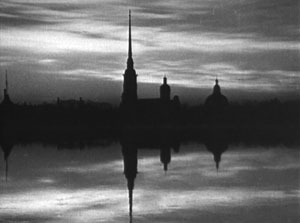 Blockade provides a remarkable insight into the siege of Leningrad during the
Second World War. Loznitsa managed to track down reels of unused footage that
had been sitting in the archives for over half a century. The material offered snapshots
of everyday life amongst Russian civilians during the siege. The reels had
not been used by the state because they were deemed inappropriate for propaganda
purposes. Loznitsa's Blockade seems to be the total opposite of typical Soviet
representations of the siege of Leningrad with their lofty pathos, celebration of
martyrdom, and scenes of heroic labor. It is remarkably non-sensationalist, it has
neither music nor running commentary - a cinematographic example of what
Barthes famously termed "writing degree zero". Yet it manages to capture and
freeze in time the spirit of suffering in the struggling city. The depth of the shots
and their graphic minimalism work to create a truly epic narrative, one that leaves
room for the viewer's very own, un-mediated response.
Blockade provides a remarkable insight into the siege of Leningrad during the
Second World War. Loznitsa managed to track down reels of unused footage that
had been sitting in the archives for over half a century. The material offered snapshots
of everyday life amongst Russian civilians during the siege. The reels had
not been used by the state because they were deemed inappropriate for propaganda
purposes. Loznitsa's Blockade seems to be the total opposite of typical Soviet
representations of the siege of Leningrad with their lofty pathos, celebration of
martyrdom, and scenes of heroic labor. It is remarkably non-sensationalist, it has
neither music nor running commentary - a cinematographic example of what
Barthes famously termed "writing degree zero". Yet it manages to capture and
freeze in time the spirit of suffering in the struggling city. The depth of the shots
and their graphic minimalism work to create a truly epic narrative, one that leaves
room for the viewer's very own, un-mediated response.
producer: Vyacheslav Telnov
screenplay: Sergei Loznitsa
editor: Sergei Loznitsa
festival info:
28th Moscow IFF, 2005 / Golden Dragon - Cracow Film
Festival, 2006 / Karlovy Vary, 2006 / 15th IFF Curtas Vila do
Conde, 2006 / Documenta, Madrid, 2006 / Flahertiana
International Documentary Film Festival, Perm, 2006
production info:
TPO 'Saint-Petersburg studio of documentary films'
Krukov kanal, 12
1980068, Saint-Petersburg, Russia
Tel: + 7 912 714 08 06
cinedoc@peterstar.ru
sales info:
Deckert Distribution GmbH
Peterssteinweg 13, 04107 Leipzig, Germany
Tel: +49 (0)341 215 66 38
Fax: +49 (0)341 215 66 39
info@deckert-distribution.com
www.deckert-distribution.com
filmography:
Today We'll Build a House, 1997 / Life, Autumn, 1999 /
The Halt, 2000 / The Settlement, 2001 /
Portrait, 2002 / Landscape, 2003
Border-Line Case
Péter Szalay / Hungary / 2006 / 32 min / Hungarian & German
In 1989 an East German couple and their 6-year-old son decided to go to the West through Hungary. The husband was shot dead by a Hungarian border guard. How and where does the family live today?
November 10. 16.00, Toldi mozi
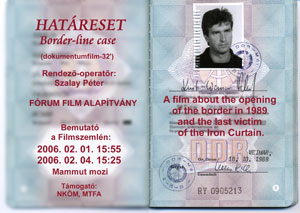 In August 1989, having lived in Weimar in the German Democratic Republic,
Kurt-Werner Schulz, Gundula Schafitel and their 6-year-old son were crossing
Hungary on their way to the Western world. Like so many of their East German
fellow compatriots, they were planning to cross the border illegally. However, they
had no hope of succeeding if all three of them stayed together. This attempt
failed tragically: the border-guard shot Kurt-Werner dead. A month later the Iron
Curtain fell. The film investigates not only the family tragedy, but evokes the
atmosphere of the times when it happened.
In August 1989, having lived in Weimar in the German Democratic Republic,
Kurt-Werner Schulz, Gundula Schafitel and their 6-year-old son were crossing
Hungary on their way to the Western world. Like so many of their East German
fellow compatriots, they were planning to cross the border illegally. However, they
had no hope of succeeding if all three of them stayed together. This attempt
failed tragically: the border-guard shot Kurt-Werner dead. A month later the Iron
Curtain fell. The film investigates not only the family tragedy, but evokes the
atmosphere of the times when it happened.
producer: János Vészi
screenplay: Péter Szalay
camera: Péter Szalay
editor: Péter Szalay
story editor: Ildikó Hidas, Ernő Nagy
sound: Lajos Pánczél
festival info:
Pál Schiffer Award - Budapest Hungarian Film Week, 2006 / Cracow Film Festival, 2006
production info:
Fórum Film Alapítvány
Solymosi Norbert
1145 Budapest, Róna u. 174.
Hungary
+ 36 1 220 5413
forumfilm@invitel.hu
filmography:
Hajóval a hegyekben., 1992 / Alsósófalvai anzix, 1997-1998 /
Pillantások, 1998 / Téltemetés, 1999-2000 / ABA-feeling, 1997-2001 /
"Csúnya betegség", 2003 / A vonat, 2004 / Drogzarándok, 2005
Checkpoint
Yoav Shamir / Machssomim / Israel & Japan / 2003 / 80 min / Hebrew & Arabic & English
Fully armed Israeli soldiers on duty at a checkpoint. Palestinians on their way to work, to the doctor or to see neighbors are forced to queue for permission to pass, regardless of the weather. Where is the border-line?!
November 9. 20.00, Toldi mozi
November 11. 22.00, Toldi mozi
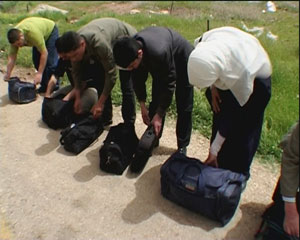 The West Bank and Gaza Strip have been under Israeli military authority since
1967. After years of terrorist attacks, dozens of these heavily guarded checkpoints
have been set up. From 2001 to 2003, director Yoav Shamir filmed and created
an incredibly honest and moving verité record of various occurrences at these
checkpoints. This experiential film conveys a saddening series of encounters
between the humiliated Palestinians and the heavily armed, often very young
soldiers, who sometimes feel uneasy in their commanding roles. But these men
are often self-assured, too, apparently taking pleasure in intimidating the
Palestinians, having them wait for hours in the burning sun or pouring rain.
The tension is palpable when a large group of Palestinian people ignores the order
to return and collectively pass the roadblocks. The general impression is one of
an endless situation, in which people on both sides are forced into positions that
leave little room for human dignity.
The West Bank and Gaza Strip have been under Israeli military authority since
1967. After years of terrorist attacks, dozens of these heavily guarded checkpoints
have been set up. From 2001 to 2003, director Yoav Shamir filmed and created
an incredibly honest and moving verité record of various occurrences at these
checkpoints. This experiential film conveys a saddening series of encounters
between the humiliated Palestinians and the heavily armed, often very young
soldiers, who sometimes feel uneasy in their commanding roles. But these men
are often self-assured, too, apparently taking pleasure in intimidating the
Palestinians, having them wait for hours in the burning sun or pouring rain.
The tension is palpable when a large group of Palestinian people ignores the order
to return and collectively pass the roadblocks. The general impression is one of
an endless situation, in which people on both sides are forced into positions that
leave little room for human dignity.
producers: Amit Breuer, Amythos Films & Edna & Elinor Kowarsky (Eden Productions)
camera: Yoav Shamir
editor: Era Lapid
festival info:
Winner of VPRO - Joris Ivens Award - IDFA, Amsterdam International Documentary Film Festival, The Netherlands, 2003/ Winner of Best Cinematography Award - DocAviv, The Tel Aviv International Documentary Film Festival, Tel Aviv, Israel, 2004 / Winner of the Golden Gate Award for Documentary Features - San Francisco International Film Festival, USA, 2004 / Winner of Best Documentary Feature Award - HotDocs, Canadian International Film Festival, Toronto, Canada, 2004 / Special Jury Mention, First Prize for Innovative Photography - Documenta Madrid International Documentary Festival, Spain, 2004 / Winner of the Special Documentary Award - Munich International Documentary Film Festival, Germany, 2004 / Winner of Best Documentary Award - Newport International Film Festival, USA, 2004/ Winner of Best Documentary Award - Calgary International Film Festival, Canada, 2004 / Winner of Best Documentary Award - Docupolis International Documentary Festival, Spain, 2004 / Winner of the Special Documentary Prize - Entrevues Film Festival Belfort, France, 2004 / Winner of the "Point of View" Prize, for Best Film - De Vista International Documentary Festival, Navarra, Spain, 2005 / Winner of Special Mention by the Jury - 4th RomaDocFest, Italy, 2005 / Winner of the "Magnolia" Award for Best Documentary in the Humanities - 11th Shanghai TV Festival, China, 2005
production info:
Eden Productions
84 Arlozorov street.,
Tel Aviv 62647, Israel
Tel: +972 3 5273403
Fax: +972 3 5236076
E-mail: eden_e@netvision.net.il
sales info:
First Hand Film
Schaffhauserstrasse 359,
8050 Zurich, Switzerland
Tel: +41 1 312 20 60
Fax: +41 1 312 20 80
E-mail: info@firsthandfilms.com
www.firsthandfilms.com
filmography:
Five Days, 2003
The Children Of Leningradsky
Hanna Polak, Andrzej Celinski / Dzieci z Leningradzkiego / Poland / 2004 / 35 min / Russian
Moscow, Leningradsky Railway Station. They beg, sniff glue, drink vodka, play on the ground - and long for their mothers.
November 10. 18.00, Toldi mozi
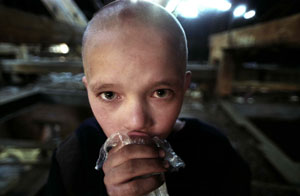 An intimate and heartbreaking chronicle of a few days in the life of a group of homeless children aged from 8 to 14, living in Leningradsky Railway Station. They spend their days begging, playing, sniffing glue, drinking vodka, and missing their mothers. They've been beaten, abandoned, abused, and discarded by drug-addicted or alcoholic parents, abusive passers-by and inhuman policemen. Many will never live to see their 15th birthdays. The camera descends into the children's murky underground dwellings or slyly captures a policeman viciously pouring glue over a young boy's head. The documentary combines footage of the
children and of the authorities, who prefer to ignore or suppress the problem. This remarkably honest, compelling journey into the hidden world of Moscow's homeless children was nominated for an Academy Award in Best Documentary Short Subject in 2004.
An intimate and heartbreaking chronicle of a few days in the life of a group of homeless children aged from 8 to 14, living in Leningradsky Railway Station. They spend their days begging, playing, sniffing glue, drinking vodka, and missing their mothers. They've been beaten, abandoned, abused, and discarded by drug-addicted or alcoholic parents, abusive passers-by and inhuman policemen. Many will never live to see their 15th birthdays. The camera descends into the children's murky underground dwellings or slyly captures a policeman viciously pouring glue over a young boy's head. The documentary combines footage of the
children and of the authorities, who prefer to ignore or suppress the problem. This remarkably honest, compelling journey into the hidden world of Moscow's homeless children was nominated for an Academy Award in Best Documentary Short Subject in 2004.
producers: Hanna Polak, Andrzej Celinski
executive producer: Sheila Nevins
screenplay: Andrzej Celinski
camera: Hanna Polak, Andrzej Celinski, Hans Jürgen Burkard
editor: Ewa Romanowska-Rózewicz, Andrzej Celinski
festival info:
IFDA, 2005 / Leeds International Film Festival, 2005 /
Tinklai, 7th International Short Film Festival, Klaipeda,
2005 / 7th International Film Festival, Bratislava, 2005 /
5th Human Rights In Film International Film Festival,
Warsaw, 2005 / Platinum Billy Goat - 23rd International
Young Audience Film Festival, Poznan´, 2006
production and sales info:
A Hanna Polak production
info@childrenofleningradsky.com
www.childrenofleningradsky.com
filmography:
Andrzej Celinski:
A Crazy World, 2003 / Grey, 2003 / A Railway Station
Ballad, 2004 / Time for Theatre, 2004 /
A Crazy World, 2004 / Kaegi, 2004
Hanna Polak:
Al, 2004
Coca - The Dove From Chechnya
Eric Bergkraut / Coca: Die Taube aus Tschetschenien / Switzerland / 2005 / 87 min / Russian & Chechen & English & German
What's really going on in Chechnya under cover of the "War Against Terror"? Relatives of those who have disappeared without trace record their personal accounts.
November 11. 20.00, Toldi mozi
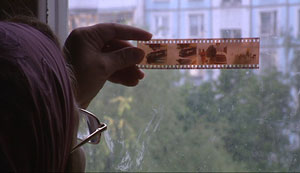 Her parents called Zainap Gashaeva "Coca" - the Dove. Born in exile in
Kazakhstan, she raised four children and became a businesswoman. Since 1994,
Zainap has been documenting what have become daily events in Chechnya: discrimination,
abduction, torture, murder. Zainap is a founder of Echoes of War, a
group of Chechen women who document the atrocities that the Russian government
has committed in Chechnya while declaring war on terror. The videos, hundreds
of them, are hidden by the women, buried under floorboards, stashed in the
backs of closets and in hollowed out walls, and smuggled out of the country by
Gashaeva and others in nondescript shopping bags as often as they can get them
out. In addition to the mountains of dusty tapes, Gashaeva and her partners have
built a database of information linking and cross-referencing facts about Chechens
who have disappeared at the hands of the state police - a painstaking record which
they hope will someday be used as a reckoning, and perhaps as a link to find out
what happened to the missing. With Chechnya closed to the international media,
Zainap Gashaeva is now bringing these tapes to the United Nations and other international
organisations to serve as evidence so that the guilty will be punished.
Her parents called Zainap Gashaeva "Coca" - the Dove. Born in exile in
Kazakhstan, she raised four children and became a businesswoman. Since 1994,
Zainap has been documenting what have become daily events in Chechnya: discrimination,
abduction, torture, murder. Zainap is a founder of Echoes of War, a
group of Chechen women who document the atrocities that the Russian government
has committed in Chechnya while declaring war on terror. The videos, hundreds
of them, are hidden by the women, buried under floorboards, stashed in the
backs of closets and in hollowed out walls, and smuggled out of the country by
Gashaeva and others in nondescript shopping bags as often as they can get them
out. In addition to the mountains of dusty tapes, Gashaeva and her partners have
built a database of information linking and cross-referencing facts about Chechens
who have disappeared at the hands of the state police - a painstaking record which
they hope will someday be used as a reckoning, and perhaps as a link to find out
what happened to the missing. With Chechnya closed to the international media,
Zainap Gashaeva is now bringing these tapes to the United Nations and other international
organisations to serve as evidence so that the guilty will be punished.
producer: Rose-Marie Schneider
screenplay: Eric Bergkraut
camera: Laurent Stoop
editor: Mireille Abramovici
music: Marie-Jeanne Serero
festival info:
Berlinale Forum, 2005 / Visions du réel, Nyon, 2005 / Tribeca Film Festival, 2005 / International Film
Festival Innsbruck, 2005 / Brisbane International Film Festival, 2005 / The World Film Festival of
Montreal, 2005 / Films from the South, Oslo, 2005 / Flanders International Film Festival, Ghent, 2005 / One World Film Festival, Bratislava, 2005 / IDFA, 2005 / Thessaloniki Documentary Film Festival, 2006
production info:
Doc Productions - Dienerstr. 7 CH-8004 Zürich
Tel: +41 44 241 1656
Fax: +41 44 241 1655
info@docproductions.ch
www.cocathedove.com
sales info:
Accent films international ltd.
Carol Spycher
46 rue de la Gare, CH-1820 Montreux
Tel: +41 21 963 93 00, mobile +41 79 631 84 14
cspycher@accent-films.com
www.accent-films.com
filmography:
Oggi siamo tutti un po' bene, 1992 / Eine Reise in den
Tod, 1992 / Das Gute Leben ist nur eine Falle, 1997 /
Kontinent K., 1998-1999 / Gesichter eines Spielers, 1999
/ Sprenge deine Grenzen, 2002 / Der fliegende Abt, 2003
The Devil's Miner
Kief Davidson, Richard Ladkani / USA & Germany / 2005 / 82 min / Spanish
In the mountains of Bolivia and far underground, the camera follows 14-year-old Basilio and his brother into the depths of a silver mine as they tempt fate daily in the hope of a better life.
November 11. 18.00, Toldi mozi
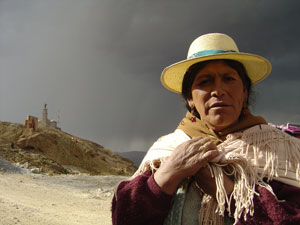 Cerro Rico was the largest silver find in the history of the Americas; mines have
operated there since the 16th century. Today, 9,000 Potosi miners work there
every day, with primitive means of protection and equipment. 14-year-old Basilio
and his 12-year-old brother Bernardino work shifts that can last up to 24 hours.
Many have been killed in accidents and the boys are well aware of the dangers
of working in the mines. Seeking safety in the dangerous conditions, Bolivian
miners honor the devil. They call him "Tio" or "Uncle" and fervently believe he
is the sole ruler of the underworld with the power to protect and destroy. The
miners have constructed hundreds of devil's chambers and make frequent offerings
of alcohol, coca leaves and cigarettes to Tio, who if treated well, may reveal
a silver seam providing wealth and security. The boys are scared of the work,
but the little money they make is needed to support their mother and younger
sister and to buy school clothing. Despite - or because of - their poverty, Basilio
and Bernardino see education as their only way out.
Cerro Rico was the largest silver find in the history of the Americas; mines have
operated there since the 16th century. Today, 9,000 Potosi miners work there
every day, with primitive means of protection and equipment. 14-year-old Basilio
and his 12-year-old brother Bernardino work shifts that can last up to 24 hours.
Many have been killed in accidents and the boys are well aware of the dangers
of working in the mines. Seeking safety in the dangerous conditions, Bolivian
miners honor the devil. They call him "Tio" or "Uncle" and fervently believe he
is the sole ruler of the underworld with the power to protect and destroy. The
miners have constructed hundreds of devil's chambers and make frequent offerings
of alcohol, coca leaves and cigarettes to Tio, who if treated well, may reveal
a silver seam providing wealth and security. The boys are scared of the work,
but the little money they make is needed to support their mother and younger
sister and to buy school clothing. Despite - or because of - their poverty, Basilio
and Bernardino see education as their only way out.
producers: Kief Davidson, Richard Ladkani
camera: Richard Ladkani
editor: Kief Davidson
music: Leonardo Heiblum and András Solis
festival info:
Rotterdam International Film Festival, The Netherlands, 2005 / Silver Hugo Best Documentary - Chicago Film Festival, USA, 2005 / FIPRESCI Prize International Film Critic Award - Hot Docs, Toronto, Canada, 2005 / Best Documentary, Spirit of Freedom Award - Jerusalem Film Festival, 2005 / Best Documentary Filmmakers, Special Mention - Tribeca Film Festival, New York, USA, 2006 / Best Documentary - Woodstock Film Festival, 2006.
production info:
Urban Landscapes Productions and La Mita Loca Films
office@thedevilsminer.com
sales info:
DOC & CO
Catherine LeClef
13 rue Portefoin
75003 Paris
Tel. +33 1 42 77 89 65, Fax +33 1 42 77 36 56
doc@doc-co.com
www.doc-co.com
filmography:
Kief Davidson:
Minor Details, 1998 / Exotic Islands, 2002, TV Series
Richard Ladkani:
Mein Vietnam - Land und kein Krieg, 2004, TV
Divorce Iranian Style
Kim Longinotto, Ziba Mir-Hosseini / UK / 1998 / 80 min / Parsi & English
Fighting for freedom with persistence and a bit of cunning. A special look into Islamic law through cases heard in a Teheran court.
November 10. 22.00, Toldi mozi
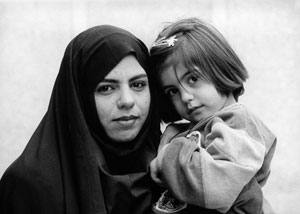 Hilarious, tragic, stirring, this fly-on-the-wall look at several weeks in an Iranian
divorce court provides a unique window into the intimate circumstances of Iranian
women's lives. Following Jamileh, whose husband beats her; Ziba, a 16 year old
trying to divorce her 38 year old husband; and Maryam, who is desperately
fighting to gain custody of her daughters, this deadpan chronicle showcases the
strength, ingenuity, and guile with which they confront biased laws, a Kafkaesque
administrative system, and their husbands' and families' rage, to win their
divorces. Longinotto and her Iranian co-director Ziba Mir-Hosseini spend several
weeks following the complainants in and outside of court as they go to great
lengths to convince the patient judge to free them. Dispelling images of Iran as a
country of war, hostages, and "fatwas", and Iranian women as passive victims of
a terrible system, this film is a subtle, fascinating look at women's lives in Iran.
Hilarious, tragic, stirring, this fly-on-the-wall look at several weeks in an Iranian
divorce court provides a unique window into the intimate circumstances of Iranian
women's lives. Following Jamileh, whose husband beats her; Ziba, a 16 year old
trying to divorce her 38 year old husband; and Maryam, who is desperately
fighting to gain custody of her daughters, this deadpan chronicle showcases the
strength, ingenuity, and guile with which they confront biased laws, a Kafkaesque
administrative system, and their husbands' and families' rage, to win their
divorces. Longinotto and her Iranian co-director Ziba Mir-Hosseini spend several
weeks following the complainants in and outside of court as they go to great
lengths to convince the patient judge to free them. Dispelling images of Iran as a
country of war, hostages, and "fatwas", and Iranian women as passive victims of
a terrible system, this film is a subtle, fascinating look at women's lives in Iran.
screenplay: Ziba Mir-Hosseini
camera: Kim Longinotto
editor: Barrie Vince
sound: Christine Flece
production managers: Lizzie Lemon, Sima Mir-Hosseini
festival info:
Best Documentary - Viewpoint International Documentary
Film Festival / Honorable Mention - Jerusalem
Documentary Festival / IDFA / Sheffield Documentary Film
Festival / Vancouver Film Festival / Marseilles Film Festival
/ Edinburgh Film Festival / Viennale International Film
Festival / Best Film
- Viewpoint International Documentary Film Festival /
Silver Hugo Award - Chicago International Film Festival /
Grand Prize for Best Documentary - San Francisco
International Film Festival
Dreaming By Numbers
Anna Bucchetti / Die Träume Neapels / The Netherlands / 2005 / 75 min / Italian
A century-old lottery-office in Naples, its owners and customers. A bingo-hall run by a transvestite and the ladies who come to play there. Numbers from dreams - in South-Italian style.
November 12. 18.00, Toldi mozi
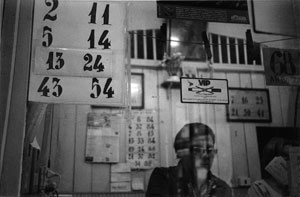 Naples has many neighborhoods with small betting shops. The daily customers
don't pick numbers at random: some play the numbers which correspond to the
dates of birth or death of relatives, others play the numbers of their dreams.
Dreams are translated into numbers with the help of the Italian numbers book
Grimas and by the knowledgeable owners of century-old lottery offices. A "reasoned
bet" happens, for example, when someone has had a dream about his father stepping
into a bucket of water. The lottery vendor takes the book out: father is 81, foot
is 53, water is 39 and bucket is 4, so these are the numbers to bet on. When a
regular customer's brother gets murdered, people even use this incident to stake
their bets. The obsession with numbers sometimes reaches hilarious proportions
("which numbers can be derived from a dream about a cockroach with a limp?"),
but behind the gambling, there are often tragic stories. A historian sees parallels
with Pythagoras' theory of numbers, which is kept alive in Italian popular culture.
Naples has many neighborhoods with small betting shops. The daily customers
don't pick numbers at random: some play the numbers which correspond to the
dates of birth or death of relatives, others play the numbers of their dreams.
Dreams are translated into numbers with the help of the Italian numbers book
Grimas and by the knowledgeable owners of century-old lottery offices. A "reasoned
bet" happens, for example, when someone has had a dream about his father stepping
into a bucket of water. The lottery vendor takes the book out: father is 81, foot
is 53, water is 39 and bucket is 4, so these are the numbers to bet on. When a
regular customer's brother gets murdered, people even use this incident to stake
their bets. The obsession with numbers sometimes reaches hilarious proportions
("which numbers can be derived from a dream about a cockroach with a limp?"),
but behind the gambling, there are often tragic stories. A historian sees parallels
with Pythagoras' theory of numbers, which is kept alive in Italian popular culture.
producers: André Bos, Hans Mulde
screenplay: Anna Maria Bucchetti
camera: Stefano Bertacchini
editor: Katarina Turler
sound: Bouwe Mulder
music: Luciano Caliendo
festival info:
Joris Ivens Award - IDFA, 2005 / Jury Award - Planete Doc, 2006 / Second Prize - Ecofilm, Rhodos, 2006 / Vesuvius Award - Napoli, 2006 / Jury Award - Flahertiana, Perm, Russia, 2006
production info:
Armadillo Film
Postbus 51056
1007 EB Amsterdam
The Netherlands
Tel: +31 20 627 3272
Fax: + 31 20 627 3265
info@armadillofilm.nl
www.armadillofilm.nl
sales info:
First Hand Films World Sales
Schaffhauserstrasse 359
8050 Zürich - Switzerland
Tel: +41 1 312 2060
Fax: +41 1 312 33080
info@firsthandfilms.com
www.firsthandfilms.com
filmography:
With Love, Me, 1994 / Turkish Delight, 1995 / You Have to Do It Yourself, 1996 / Through Our Own Eyes in Sarajevo, 1996 / Endless Start , 1997 / Solidair, 1998 / Genoa Through My Own Eyes, 2001 / An Italian Story, 2002
Elechek
Nailya Rakhmadieva / Kyrgyzstan / 2006 / 27 min / Kyrgyz
The house is finished at last, the children are growing up, life is peaceful. Then he brings home a new wife. Polygamy in Kyrgyzstan.
November 11. 16.00, Toldi mozi
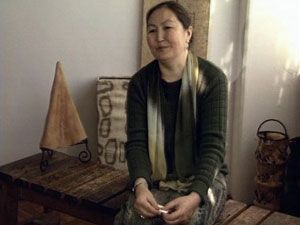 Sairash was an exemplary wife for twenty years. After her wedding, she put her
former life "on hold" and began to create a new one with her husband, building
a house with the modest means available and finding joy in every new success on
the road to their future together. When the new home was finally completed, her
husband brought a new, younger wife into the household, deciding to form a family
with both women and their children. Sairash couldn't stand the new arrangement
and after a while she left home. In rebelling against the accepted order, did she
become a bad wife, or an example and model for all women in a similar predicament?
Weaving together scenes from Sairash's daily routine with frank interviews
- both with Sairash herself and with those close to her - the filmmaker creates
a picture of her transformed life. The documentary is also a commentary on the
current situation in Kyrgyzstan where the female population exceeds the male,
leading to frequent cases of polygamy. Sairash still wears the "elechek"
- a traditional high headdress worn by elderly married women in Kyrgyzstan.
The filmmaker sensitively contrasts her rebellion with the conservative majority
view that families should stay together, no matter how high the cost.
Sairash was an exemplary wife for twenty years. After her wedding, she put her
former life "on hold" and began to create a new one with her husband, building
a house with the modest means available and finding joy in every new success on
the road to their future together. When the new home was finally completed, her
husband brought a new, younger wife into the household, deciding to form a family
with both women and their children. Sairash couldn't stand the new arrangement
and after a while she left home. In rebelling against the accepted order, did she
become a bad wife, or an example and model for all women in a similar predicament?
Weaving together scenes from Sairash's daily routine with frank interviews
- both with Sairash herself and with those close to her - the filmmaker creates
a picture of her transformed life. The documentary is also a commentary on the
current situation in Kyrgyzstan where the female population exceeds the male,
leading to frequent cases of polygamy. Sairash still wears the "elechek"
- a traditional high headdress worn by elderly married women in Kyrgyzstan.
The filmmaker sensitively contrasts her rebellion with the conservative majority
view that families should stay together, no matter how high the cost.
screenplay: Nilya Rakhmadieva
camera: Sapar Kochumanov
festival info:
One World 8th International Human Rights Documentary Rights Festival, Prague, Czech Republic, 2006 / 3rd Golden Apricot IFF, Yerevan, Armenia, 2006
production and sales info:
Elena Vitenberg
Manager of Gender Montage
Institute for Social and Gender Policy
Mokhovaya str. 15
St. Petersburg, 191028, Russia
Tel: +7812 346 7068
vitenberg@lfond.spb.ru
www.genderpolicy.ru
Phoebe Schreiner
Program Officer
Network Women's Program
Open Society Institute
400 West 59th Street
New York, NY 10019
USA
Tel: +1 212 548 0162
Fax: + 1 212 548 4616
women@sorosny.org
filmography:
Avitaminosis, 1999 / Well Paid Job, 2000 / I Love My Family, 2001
The Face Of The Revolution. In Search Of A Budapest Girl
Attila Kékesi / Hungary / 2006 / 78 min / Hungarian & English & French
What happened to the "heroine of Budapest" after she featured in Paris Match, 10 November 1956? Tracing her through Austria and Switzerland to the other side of the World.
November 11. 12.00, Toldi mozi
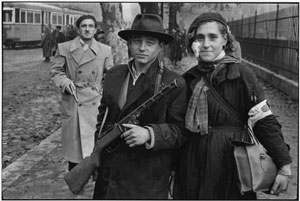 A young man and a girl on Múzeum boulevard in Budapest, shoulder to shoulder,
looking directly into the camera. The image appeared on the inner front page of
the 30 October 1956 issue of Paris Match. 45 years after the photo was taken,
historian Eszter Balázs and journalist Phil Casoar set out to trace the young
couple and find out who they were, whether they survived the revolution, and if
so, where they live. The film follows them in their quest. Since there was more
information available about the girl, she is the one whose path the filmmakers
trace. It turns out that the Paris Match image of the revolutionary girl is not
simply a record of a moment in her life, but the publication of the photo in the
Western press actually influenced her entire life. She had to flee Hungary partly
because of it. On the other hand, it made her one of the best-known immigrants.
She tried to become identical with the image of that photograph, therefore in the
eyes of her acquaintances she remained the Hero of the Revolution. In the film,
witnesses of her life, as well as the photographer tell their stories.
A young man and a girl on Múzeum boulevard in Budapest, shoulder to shoulder,
looking directly into the camera. The image appeared on the inner front page of
the 30 October 1956 issue of Paris Match. 45 years after the photo was taken,
historian Eszter Balázs and journalist Phil Casoar set out to trace the young
couple and find out who they were, whether they survived the revolution, and if
so, where they live. The film follows them in their quest. Since there was more
information available about the girl, she is the one whose path the filmmakers
trace. It turns out that the Paris Match image of the revolutionary girl is not
simply a record of a moment in her life, but the publication of the photo in the
Western press actually influenced her entire life. She had to flee Hungary partly
because of it. On the other hand, it made her one of the best-known immigrants.
She tried to become identical with the image of that photograph, therefore in the
eyes of her acquaintances she remained the Hero of the Revolution. In the film,
witnesses of her life, as well as the photographer tell their stories.
producer, operatőr: Attila Kékesi
co-producer: Jean-Pierre Jeunet
camera: Attila Kékesi
story: Eszter Balázs, Phil Casoar
music: Ferenc Darvas
dramaturg: Noémi Blastik
digital effects: Miklós Falvay
screenplay: Eszter Balázs, Phil Casoar, Attila Kékesi
sales info:
Attila Kékesi
Tel.: + 36 30 330 23 63 (cell)
kekesi@index.hu
filmography:
Trapéz, 1996 (camera) / Hajni, 1996 (camera) / Jézus
Krisztus Sükösdön, 1996 (camera) / Tandori, 1996 (camera)
/ A kor szelleme, 1998 / A cipész szerencséje, 2001 /
Vargabetű, 2002
God Is With Us, Men That Is
Jan Sosiński / Bóg jest z nami, mężczyznami / Poland / 2005 / 46 min / Albanian
She shaves, smokes, drinks and plays dominoes with the men. But she was born a woman in the hills of Northern Albania.
November 9. 20.00, Toldi mozi
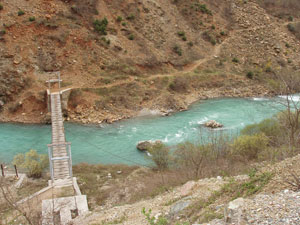 Shot in a village in Northern Albania, the film tells the story of a woman who
decides to become a man of her own free will. Bedri is the masculine form of the
name Bedrie. Before her whole family, she solemnly pledges to become a man.
This peculiar "rite of passage" exists in the mountains of Albania. The entire local
community fully accepts and respects Bedri as they would a man. Her brothers
will never blush from now on, as she is not going to bring shame upon them. As
a man she must have no interaction with women, never have children and remain
a virgin till the end of her days. Yet her advice in arranging marriages is valued by
the community. Those who do not know her take her for a man anyway since
Bedri shaves and dresses like one. Bedri smokes, drinks, plays domino with men
and football with village boys. He declares that he is happy with his own self.
Shot in a village in Northern Albania, the film tells the story of a woman who
decides to become a man of her own free will. Bedri is the masculine form of the
name Bedrie. Before her whole family, she solemnly pledges to become a man.
This peculiar "rite of passage" exists in the mountains of Albania. The entire local
community fully accepts and respects Bedri as they would a man. Her brothers
will never blush from now on, as she is not going to bring shame upon them. As
a man she must have no interaction with women, never have children and remain
a virgin till the end of her days. Yet her advice in arranging marriages is valued by
the community. Those who do not know her take her for a man anyway since
Bedri shaves and dresses like one. Bedri smokes, drinks, plays domino with men
and football with village boys. He declares that he is happy with his own self.
producers: Piotr Śliwiński, Ireneusz Niewolski
screenplay: Jan Sosiński
camera: Andrzej Wolf
editor: Paweł Laskowski
festival info:
Krakow Film Festival, Poland, 2006 / Special Award from the Ministry of Culture - FilmFest Warsawa, Poland, 2006
production and sales info:
Studio Filmowe Kalejdoskop
for Redakcja Form Dokumentalnych Program 1
Telewizja Polska SA
ul. Chełmska 21, 00-724
Warszawa, Poland
Tel: +022 8511779
Fax + 022 8412135
sliwinski@kalejdoskop.art.pl
selected filmography:
A Different World 1993 / The Lord on the Moon, 1993 / Nobody
Dies in a Film, 1993 / Eight Millimetres of Memory, 1996 /
I Made Myself the Executioner, 1996 / Dad, Do You Remember?
1998 / I'm Going to Tell You About Marek, 1999 / The Last
Pictures. The Notebook, 2000 / In Search of the Lost Years,
2001 / The Business Trip, 2003 / We Are In Europe, 2003
Here We Are
Jaroslav Vojtek / My zdes / Slovak Republic / 2005 / 76 min / Russian & Slovak
Relocation, forced migration. From Central Slovakia to Sub-Carpathian Ukraine, then to Kazakhstan. Is there a way back after 50 years?
November 12. 14.00, Toldi mozi
producer: Mario Homolka, David Čorba for LEON Productions
screenplay: Andrej Bán, Jaroslav Vojtek, Marek Leščák
camera: Jaroslav Vojtek
editor: Maroš Šlapeta
sound: Marek Lacena
music: Sergei Kiossya
festival info:
Czech Minister of Culture Award for the Best Film - 8th One World International Festival of Documentary Films, Prague, Czech Republic, 2006 / Krakow Film Festival, Poland, 2006
production and sales info:
LEON Productions
Tranovského 55
841 02 Bratislava
Slovak Republic
Tel: +00421 2 6453 3992, +421 905 609 173 (cell)
Fax: +00421 2 6446 2784
leon@leonproductions.sk
corba@leonproductions.sk
www.myzdes.sk
filmography:
Blind Belief, 1993 / If the Bell's Toll Were Magic, 1994 / Hair II, 1995 / Storm, 1995 / She Does
Not Know Me, I Don´t Know Her..., 1996 / Stone by Stone, 1996 / Once in the East, 2000 / Unwanted
Children, 2001 / Fish Tank, 2001 / Crazy Man, 2003
Holidays
Marina Razbezhkina / Kanikuly / Russia / 2005 / 52 min / Manshi & Russian
Snow, dogs and hunting - tea and vodka. The traditional lifestyle becomes holiday fun for the Mansi children.
November 12. 18.00, Toldi mozi
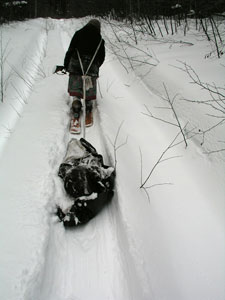 The Mansi children at the boarding school in the small town of Ivdel' - the northernmost
town in Sverdlovsk region, 535 kilometers from Ekaterinburg - are waiting
impatiently for the winter break. They are eager to return to their native village,
where there are no televisions or computer games. It takes a whole day to
cover a hundred and fifty kilometers in a weather-beaten lorry, through forests and
snow-covered plains. Yet nothing is better than home, where you can go sledging,
jump off the roof into the snow, or play cards with grandmother in the bleak light
of the kerosene lamp all evening long. Witnessing the everyday life of Treskol'e
villagers, this meditative and attentive film carries the viewers across both time
and space. The laconic routine is interrupted by accidents which punctuate the
predictable passage of time: a child burns himself, a car falls through the ice,
somebody gets lost in the woods. The self-appointed shaman advises the locals to
leave the village - too few families cannot make a living any longer. The holidays
are a short break from town life for the children - will any of them decide to
return for good?
The Mansi children at the boarding school in the small town of Ivdel' - the northernmost
town in Sverdlovsk region, 535 kilometers from Ekaterinburg - are waiting
impatiently for the winter break. They are eager to return to their native village,
where there are no televisions or computer games. It takes a whole day to
cover a hundred and fifty kilometers in a weather-beaten lorry, through forests and
snow-covered plains. Yet nothing is better than home, where you can go sledging,
jump off the roof into the snow, or play cards with grandmother in the bleak light
of the kerosene lamp all evening long. Witnessing the everyday life of Treskol'e
villagers, this meditative and attentive film carries the viewers across both time
and space. The laconic routine is interrupted by accidents which punctuate the
predictable passage of time: a child burns himself, a car falls through the ice,
somebody gets lost in the woods. The self-appointed shaman advises the locals to
leave the village - too few families cannot make a living any longer. The holidays
are a short break from town life for the children - will any of them decide to
return for good?
producers: Natalia Zheltukhina, Grigory Libergal
screenplay: Marina Razbezhkina
camera: Irina Uralskaya, Ivan Alferov
editor: Yuri Geddert
sound: Viktor Brus
festival info:
Message to Man, International Documentary, Short and Animated Films Festival, St. Petersburg, Russia, 2006
production and sales info:
Studio RISK-FILM
Likhov pereulok 4-1
Moscow 127051, Russia
Tel: + 7 495 2094066, Tel/Fax: + 7 495 209 4055
movie@riskstudio.ru
film@riskstudio.ru
filmography:
And Love Him Deep in Your Heart, 1990 / Assumption, 1991 / The Concert Upon the Listeners' Claim,
1991 / And Man Is Playing Trumpet, 1994 / The Strange Freedom of Existence, 1995 / Underground,
1998 / Gennady Aigi, 2001 / The Harvest Time, 2004
I Never Want To Be Famous
Mercedes Stalenhoef / Ik wil nooit beroemd worden / The Netherlands / 2005 / 75 min / Dutch
Tobias was a celebrated cellist. A stroke confined him to a wheelchair. He's fed, washed and changed. Would he choose life if he were aware of living? A film about life, death and euthanasia.
November 12. 16.00, Toldi mozi
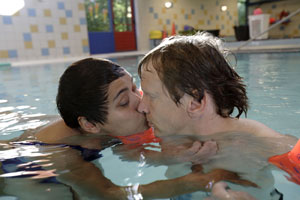 "I don't ever want to be famous", Tobias mumbles. Tobias is a seriously disabled
man and a great Bach enthusiast. Before he went into cardiac arrest and was left
handicapped, he was a successful cellist. Now he is in a wheelchair suffering
from spastic paralysis and unable to understand very much. By means of archival
footage of concerts, photographs and memories of his relatives and a good friend,
a picture emerges of the former Tobias, Tobias the cellist. This image is interwoven
with images of Tobias today and his life in an institution for the mentally disabled.
The contrast between these two worlds illustrates the tough issues Tobias's
relatives must grapple with. How much of Tobias is still there? Would he have
wanted to live like this? Would it be better if the heart failure had been fatal, or
can Tobias still enjoy life? Candidly and sincerely, his relatives and friends discuss
the dilemmas that confront them. Tobias himself is hardly, if at all, aware of
the questions surrounding him. He enjoys Bach, cries when people leave and
says he wants to live to be a thousand years old.
"I don't ever want to be famous", Tobias mumbles. Tobias is a seriously disabled
man and a great Bach enthusiast. Before he went into cardiac arrest and was left
handicapped, he was a successful cellist. Now he is in a wheelchair suffering
from spastic paralysis and unable to understand very much. By means of archival
footage of concerts, photographs and memories of his relatives and a good friend,
a picture emerges of the former Tobias, Tobias the cellist. This image is interwoven
with images of Tobias today and his life in an institution for the mentally disabled.
The contrast between these two worlds illustrates the tough issues Tobias's
relatives must grapple with. How much of Tobias is still there? Would he have
wanted to live like this? Would it be better if the heart failure had been fatal, or
can Tobias still enjoy life? Candidly and sincerely, his relatives and friends discuss
the dilemmas that confront them. Tobias himself is hardly, if at all, aware of
the questions surrounding him. He enjoys Bach, cries when people leave and
says he wants to live to be a thousand years old.
producers: Niek Koppen, Jan de Ruiter for Self Made Films
screenplay: Mercedes Stalenhoef
camera: Peter Brugman, Erik van Empel
editor: Gys Zevenbergen
sound: Bouwe Mulder
festival info:
IDFA, Amsterdam, The Netherlands, 2005 / International Film Festival, Rotterdam, The Netherlands, 2006
production and sales info:
Selfmade Films
Willemsparkweg 63
1071 GS Amsterdam
The Netherlands
Tel: + 31 20 3058555
Fax: +31 203058550
mail@selfmadefilms.nl
www.selfmadefilms.nl
filmography:
I just take my toys with me, 2001 / Godofredo lives, 2004
The Immortal
Mercedes Moncada Rodríguez / El Inmortal / Nicaragua / 2005 / 78 min / Spanish
A family torn apart and maimed by the cross-fire of the civil war in Nicaragua. Contras and Sandinistas in the same family.
November 11. 16.00, Toldi mozi
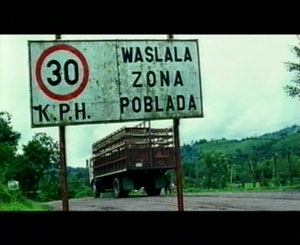 In 1979, the Sandinista Revolution in Nicaragua ended the dictatorship of the
Somoza family. Fearing a second Cuba, the Reagan Administration financed and
armed the counter-revolutionaries. What followed was a long and bloody civil war that
left many Nicaraguans with deep scars. When Contras and Sandinistas clashed on 3
April 1983 around the village of Waslala, the Rivera family - mother Julia, daughters
Maria and Reina, son Emilio and twins José and Juan - was literally caught in the
crossfire. Maria saw her husband tortured to death and Emilio (13) and José (12)
kidnapped and recruited by the Contras. 15-year-old Reina went along to watch over
them, unaware of the fact that the Contras "went through women like towels." Twin
brother Juan remained behind and later, as a conscript on the Sandinista side, fought
against his own brother. Twenty years later, the tension is still palpable. The vivid
memories of the war and the feelings of hatred and shame make it hard to pick up
the pieces. Meanwhile an empty truck called "El Immortal" travels through the
village. Director Moncada Rodríguez uses this truck as the leitmotif and shows a
country where the war still haunts the villages and the jungle.
In 1979, the Sandinista Revolution in Nicaragua ended the dictatorship of the
Somoza family. Fearing a second Cuba, the Reagan Administration financed and
armed the counter-revolutionaries. What followed was a long and bloody civil war that
left many Nicaraguans with deep scars. When Contras and Sandinistas clashed on 3
April 1983 around the village of Waslala, the Rivera family - mother Julia, daughters
Maria and Reina, son Emilio and twins José and Juan - was literally caught in the
crossfire. Maria saw her husband tortured to death and Emilio (13) and José (12)
kidnapped and recruited by the Contras. 15-year-old Reina went along to watch over
them, unaware of the fact that the Contras "went through women like towels." Twin
brother Juan remained behind and later, as a conscript on the Sandinista side, fought
against his own brother. Twenty years later, the tension is still palpable. The vivid
memories of the war and the feelings of hatred and shame make it hard to pick up
the pieces. Meanwhile an empty truck called "El Immortal" travels through the
village. Director Moncada Rodríguez uses this truck as the leitmotif and shows a
country where the war still haunts the villages and the jungle.
producers: Aaron Fernandez Lesur, Mercedes Moncada Rodríguez, Puy Oria, Montxo Armendariz
screenplay: Mercedes Moncada Rodríguez
camera: Javier Morón Tejero
editor: Viviana García, Mercedes Moncada Rodríguez
festival info:
Latin Beat Film Festival, San Francisco, USA, 2005 / Seattle International Film Festival, USA, 2005 / One World Annual International Human Rights Documentary Festival, Prague, Czech Republic, 2005 /
Best Iberoamerican Documentary - Festival Internacional de Cine de Guadalajara, Mexico, 2006 / Sheffield International Documentary Film Festival, UK, 2006
production info:
Mercedes Moncada Rodríguez for Chango Films
C/Cervantes No. 8. Bajo Derecha
CP 28014 Madrid, Spain
Tel/Fax: +3491 429 4498
monqui@telefonica.net
sales info:
Andrew Herwitz
The Film Sales Company
443 Greenwich Street #5A
New York
10013 U.S.A.
Tel: +1 212 625 0535
Fax: +1 212 625 0534
andrew.herwitz@filmsalescorp.com
filmography:
The Passion of María Elena, 2003
The King Of Velichovky
Jan Šikl / Král Velichovek / Czech Republic / 2005 / 52 min / Czech
The dramatic story of the Seissers, Sudeten-German land-owners from a little spa town in Bohemia. Lili married a Czech doctor, Ria dated a German clerk, while Edith bore a child to a Nazi colonel. Our XXth century through amateur footage.
November 9. 16.00, Toldi mozi
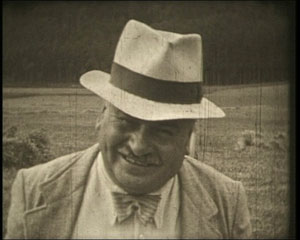 The dramatic story of the Seissers, a Sudeten-German family of prosperous landowners
from Velichovky, a little spa town in Bohemia. Drawing on a large family
film archive and the recollections of relatives and contemporaries, the director
performs at once the function of family chronicler and "time archeologist", reconstructing
their life in the 1930-40s, as everyday routine and festivities become
more and more intertwined with "big history". Karl's oldest daughter Lili gets
married to a Czech doctor in 1934 and the family travels to Germany for the
occasion, filming the changing face of Berlin. Ria is dating a low-class clerk of
German origin, who gradually starts taking advantage of his ethnic background.
Edith, the youngest and most stubborn and rational, falls for a Nazi colonel much
older then herself. The birth of their son coincides with his promotion to general
in the German army. Adding to the private recordings a soundtrack which is at
times meditative or anxious, the director makes us ponder on the complex fusion
of personal choices and responsibilities. The flow of time, neither completely lost
nor fully recaptured, is nurtured by exceptional intimacy, reachable only with very
close people. In 1992, the director Jan Sˇ ikl founded an Archive of Private Film
History. King of Velichovky is part of the on-going project called Private Century.
The dramatic story of the Seissers, a Sudeten-German family of prosperous landowners
from Velichovky, a little spa town in Bohemia. Drawing on a large family
film archive and the recollections of relatives and contemporaries, the director
performs at once the function of family chronicler and "time archeologist", reconstructing
their life in the 1930-40s, as everyday routine and festivities become
more and more intertwined with "big history". Karl's oldest daughter Lili gets
married to a Czech doctor in 1934 and the family travels to Germany for the
occasion, filming the changing face of Berlin. Ria is dating a low-class clerk of
German origin, who gradually starts taking advantage of his ethnic background.
Edith, the youngest and most stubborn and rational, falls for a Nazi colonel much
older then herself. The birth of their son coincides with his promotion to general
in the German army. Adding to the private recordings a soundtrack which is at
times meditative or anxious, the director makes us ponder on the complex fusion
of personal choices and responsibilities. The flow of time, neither completely lost
nor fully recaptured, is nurtured by exceptional intimacy, reachable only with very
close people. In 1992, the director Jan Sˇ ikl founded an Archive of Private Film
History. King of Velichovky is part of the on-going project called Private Century.
screenplay: Jan Šikl
editor: Jan Daňhel
sound: Dan Němec
festival info:
Best Czech Documentary Film - Jihlava International Documentary Film Festival, 2005
production info:
PRAGAFILM
Londýnská 28
Praha 12000, Czech Republic
Tel: +42 222 522 282, + 420 608 250 005 (cell)
Fax: +42 222 522 242
pf@wo.cz
sales info:
CZECH TELEVISION - TELEXPORT
Londýnská 28 /Kavčí hory
Praha 14000, Czech Republic
Tel: + 42 222 522 282 / 26 11 37 047
Fax: + 42 222 522 242 / 26 12 11 354
jarmila.svorcova@czech-tv.cz
telexport@czech-tv.cz
www.czech-tv.cz
filmography:
On the Road, 2003 / Winning Your Heart, 2004 / Daddy and Lili Marlen, 2005
Moszny
Róbert Lakatos / Hungary / 2005 / 40 min / Hungarian
Everyday life in Cluj Napoca, Romania. Jozsef Moszny's cows graze among the blocks of flats and between the tennis courts. What future awaits them and their owner if the city council demolishes his weekend house like they did his home?
November 12. 12.00, Toldi mozi
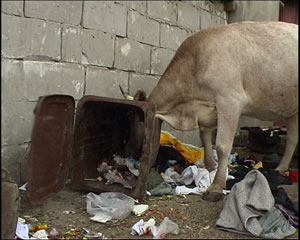 Construction of the Lakeside housing development in Cluj - Napoca (Romania)
began in the 1980s. Most of the private homes were demolished. The Moszny
family were evicted against their will. József Moszny did not move into the apartment
building that was offered to him in exchange to his house, instead, he withdrew
with his cows, dogs and cats to his plot of land in between the two lakes. He
has been reported several times because the cows wandered around the housing
estate and the tennis courts in Cluj. The film follows the life of Mr. Moszny during
one year.
Construction of the Lakeside housing development in Cluj - Napoca (Romania)
began in the 1980s. Most of the private homes were demolished. The Moszny
family were evicted against their will. József Moszny did not move into the apartment
building that was offered to him in exchange to his house, instead, he withdrew
with his cows, dogs and cats to his plot of land in between the two lakes. He
has been reported several times because the cows wandered around the housing
estate and the tennis courts in Cluj. The film follows the life of Mr. Moszny during
one year.
producer: András Muhi
screenplay: Róbert Lakatos
camera: Arthur Bálint, Róbert Lakatos
production info:
Inforg Studió
1092 Budapest, Kinizsi utca 11.
Hungary
Tel.: + 36 1 219 0961
inforg@inforgstudio.hu
filmography:
Feszületi feszültség, 1997 /
Nyáron piros, télen kék., 1999 /
Csendország, 2001 /
Gen(i)us Diabolis - Ördögtérgye, 2003 / Spílerek, 2004
The Mother's House
François Verster / South Africa / 2006 / 76 min / Afrikaans & English
Cape Town. Should she stay or go? Miché searches for happiness in a world ruled by drugs, gangs and AIDS.
November 12. 16.00, Toldi mozi
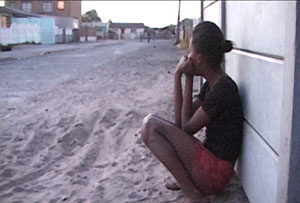 An intimate and emotional record of four years in the life of Miché, a charming, precocious
yet troubled teenage girl growing into womanhood in post-Apartheid South
Africa. Living with her mother and grandmother in Bonteheuwel, a "colored" township
outside Cape Town, she has to face not only life in a community troubled by gangsterism
and drug abuse, but also what it means to break the unbearable cycle of emotional
and physical violence imprisoning her own family. Miché's mother Valencia is an
ex-Struggle activist, now an unemployed single mother, HIV positive and about to give
birth to her third child. Deeply affected by the world she has grown up in and dominated
by unresolved conflicts with her own mother Amy, she increasingly shifts
responsibility for her own problems onto Miché. Just entering high school, Miché is in
many ways an ordinary innocent girl: she has her ears pierced for the first time, hosts
her first dancing party, and finds her first boyfriend. Yet her home situation forces her
to bear the responsibility not only for her mother's anger and general health, but also
for the emotional well-being of her younger siblings. Torn between leaving home to
escape abuse and protecting those she loves, she takes a wrong turning - before finally
learning to make sense of her mother, her grandmother and the world she lives in.
An intimate and emotional record of four years in the life of Miché, a charming, precocious
yet troubled teenage girl growing into womanhood in post-Apartheid South
Africa. Living with her mother and grandmother in Bonteheuwel, a "colored" township
outside Cape Town, she has to face not only life in a community troubled by gangsterism
and drug abuse, but also what it means to break the unbearable cycle of emotional
and physical violence imprisoning her own family. Miché's mother Valencia is an
ex-Struggle activist, now an unemployed single mother, HIV positive and about to give
birth to her third child. Deeply affected by the world she has grown up in and dominated
by unresolved conflicts with her own mother Amy, she increasingly shifts
responsibility for her own problems onto Miché. Just entering high school, Miché is in
many ways an ordinary innocent girl: she has her ears pierced for the first time, hosts
her first dancing party, and finds her first boyfriend. Yet her home situation forces her
to bear the responsibility not only for her mother's anger and general health, but also
for the emotional well-being of her younger siblings. Torn between leaving home to
escape abuse and protecting those she loves, she takes a wrong turning - before finally
learning to make sense of her mother, her grandmother and the world she lives in.
producer: Neil Brandt
camera: François Verster
editor: Peter Neal
music: Peter Coyte
festival info:
Best Documentary - Cape Town World Cinema Festival, 2005 / Best Documentary - Zimbabwe International Film Festival, 2006 / The Jury's Special Mention - Norwegian Film Festival, 2006 / Official Selection at INPUT, Taipei, 2006 / Premio Diocesi di Milano 2006 - Milan Africa, Asia & Latin America Festival
production info:
Luna Films
2 Westmeath Ave
Parkview 2192
Johannesburg
2193 South Africa
Tel: +27 83 4113063
Fax: +27 11 4825419
info@themothershouse.co.za
www.themothershouse.co.za
sales info:
Maëlle Guenegues
Doc & Co
13 rue Portefoin
Paris F-75003, France
Tel: +33 1 42 77 56 87
Fax: +33 1 42 77 36 56
doc@doc-co.com
www.doc-co.com
filmography:
Pavement Aristocrats 1998 / The Story of "Mbube", 1999 / The Man who Would Kill Kitchener, 1999 /
The Granite war, 2000 / Guilty, 2001 / A Lion's Trail, 2002 / When the War is Over, 2002
New Penelope
Georgii Dzalaev / Penelopai mo / Tajikistan / 2006 / 26 min / Tadjik
Tadjik migrants work illegally in Russia, often taking a second wife there. Back home with the children, their first wives end up in poligamous relationships to keep body and soul together.
November 12. 12.00, Toldi mozi
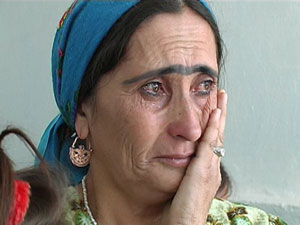 Economic depression and political chaos force Tajik men to become migrant
laborers, working - many of them in Russia - in unsafe conditions for uncertain
wages. Staying away for years, they sometimes form new families away from
home. Tajik women are left on their own to provide for their dependants, and in
some cases, enter polygamous marriages to feed themselves and their families.
Like Penelope, the wife of the mythical hero Odysseus, these women spend large
parts of their lives waiting for their husbands to return. The men working abroad
and the women left behind face the same fate: hard work and abuse of human
rights. This film allows the viewer to experience the hardships of migrant laborers
through the eyes of both women and men.
Economic depression and political chaos force Tajik men to become migrant
laborers, working - many of them in Russia - in unsafe conditions for uncertain
wages. Staying away for years, they sometimes form new families away from
home. Tajik women are left on their own to provide for their dependants, and in
some cases, enter polygamous marriages to feed themselves and their families.
Like Penelope, the wife of the mythical hero Odysseus, these women spend large
parts of their lives waiting for their husbands to return. The men working abroad
and the women left behind face the same fate: hard work and abuse of human
rights. This film allows the viewer to experience the hardships of migrant laborers
through the eyes of both women and men.
screenplay: Georgii Dzalaev, Aloudin Abdoolloev
camera: Georgii Dzalaev
festival info:
Cracow Film Festival, Poland, 2006 / One World International Human Rights Documentary Film Festival, Prague, Czech Republic, 2006
production and sales info:
Elena Vitenberg
Manager of Gender Montage
Institute for Social and Gender Policy
Mokhovaya str. 15
St. Petersburg, 191028, Russia
Tel: +7812 346 7068
E-mail: vitenberg@lfond.spb.ru
www.genderpolicy.ru
Phoebe Schreiner
Program Officer
Network Women's Program
Open Society Institute
400 West 59th Street
New York, NY 10019
USA
Tel: +1 212 548 0162
Fax: + 1 212 548 4616
Email: women@sorosny.org
filmography:
Who are We?, 1989 / Sweet, Sweet Home, 1998 / Noah's Arch, 1999 / At the Same Time With a Century, 2000 / Live Containers, 2002 / Transfiguration, 2003 / Before the Thunderstorm, 2005
One Day In People's Poland
Maciej Drygas / Jeden dzień w PRL / Poland & France & Germany / 2005 / 52 min / Polish
A mosaic of agents' reports, pages from a butcher's "complaints book", secret policemen's files, letters to and from jail, atomic alert practice in a country village. Things we have forgotten, though they're unforgettable: everyday life in a communist country.
November 10. 16.00, Toldi mozi
producers: Jasques Debs for ADR productions, Maciej Drygas for Drygas Production, Krysztof Talczewski for TVP (Channel 1)
editor: Katarzyna Maciejko-Kowalczyk
sound: Iwo Klimek
music: Pawel Szymanski
festival info:
IDFA, Amsterdam, The Netherlands, 2005 / One World International Documentary Human Rights Film Festival, Prague, Czech Republic, 2006 / Krakow Film Festival, Poland, 2006 / Polish Film Festival in America, Chicago, USA, 2006
production info:
ADR productions
2, Rue de la Roquatte, Escalier Avril
75011 Paris, France
Tel: +33 1 431 43434
Fax: +33 1 431 43430
adr.productions@wanadoo.fr
Drygas Production
11/84 Limanwoskiego str.
Warsaw, Poland
Tel: +48 22 6515058
Fax: +48 22 651 5634
doug@d-word.com
mvfilm@polbox.com
sales info:
TVP SA
17, J.P. Woronicz str.
00-999 Warsaw, Poland
Tel: +48 22 547 6139
Fax: +4822 547 7583
sales@tvp.pl
www.tvp.pl
filmography:
False Start, 1981 / Psychotherapy, 1984 / Hear My Cry, 1991 / State of Weightlessness, 1994 / Voices of Hope, 2002
Our Daily Bread
Nikolaus Geyrhalter / Unser täglich Brot / Austria / 2005 / 92 min
Tableau of food production in our Brave New World: multicolor, wide screen, hygienic - yet frightening. Make sure you eat before buying a ticket.
November 9. 22.00, Toldi mozi
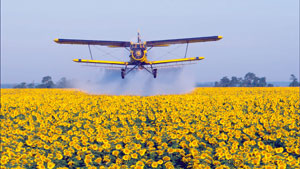 Welcome to the world of industrial food production and high-tech farming! To the
rhythm of conveyor belts and immense machines, the film looks without commenting
into the places where food is produced in Europe: monumental spaces, surreal landscapes
and bizarre sounds - a cool, industrial environment which leaves little space
for individualism. People, animals, crops and machines play a supporting role in the
logistics of this system which provides our society's standard of living. Our Daily Bread
is a wide-screen tableau of a feast which isn't always easy to digest - and in which we
all take part. A pure, meticulous and visually stunning film that enables the audience
to form their own ideas. A rare experience for anyone who cares about food and our
planet. Content warning: Contains some graphic material related to animal processing.
Welcome to the world of industrial food production and high-tech farming! To the
rhythm of conveyor belts and immense machines, the film looks without commenting
into the places where food is produced in Europe: monumental spaces, surreal landscapes
and bizarre sounds - a cool, industrial environment which leaves little space
for individualism. People, animals, crops and machines play a supporting role in the
logistics of this system which provides our society's standard of living. Our Daily Bread
is a wide-screen tableau of a feast which isn't always easy to digest - and in which we
all take part. A pure, meticulous and visually stunning film that enables the audience
to form their own ideas. A rare experience for anyone who cares about food and our
planet. Content warning: Contains some graphic material related to animal processing.
producers: Michael Kitzberger for Nikolaus Geyrhalter Filmproduktion GmbH, Markus Glaser, Wolfgang Widerhofer
screenplay: Wolfgang Widerhofer, Nikolaus Geyrhalter
camera: Nikolaus Geyrhalter
editor: Wolfgang Widerhofer
sound: Hjalti Bager-Jonathansson, Andreas Hamza, Stefan Holzer
festival info:
Special Jury Award - IDFA, Amsterdam, The Netherlands 2005 / Best Film - Ecocinema International Film Festival, Athens, Greece, 2006 / Honourable Mention - Special Jury Prize - International Feature - Hot Docs Canadian International Documentary Festival, Toronto, 2006 / Special John Templeton Prize - Visions du Réel, Nyon, Switzerland, 2006
production info:
NIKOLAUS GEYRHALTER FILMPRODUKTION GMBH
Hildebrandgasse 26
Wien
A-11 Austria
tel: +43 140 301 62
fax: +43 140 301 62
office@geyrhalterfilm.com
www.geyrhalterfilm.com
sales info:
AUTLOOK Filmsales
Zieglergasse 75/1 A-1070 Vienna
Tel: +43 720 5535 70
Fax: +43 720 5535 72
welcome@autlookfilms.com
www.autlookfilms.com
filmography:
Washed Ashore, 1994 / The Year After Dayton, 1997 /
Pripyat, 1999 / Elsewhere, 2001 / Temelin. A Village in
Southern Bohemia, 2002 / Senad and Edis, 2003
The Person De Leo N.
Alberto Vendemiatti / La Persona De Leo N. / Italy / 2005 / 86 min / Italian
When he was 12, Nicola de Leo already knew he wanted to become a woman. Today the 40-year-old transsexual lives in Venice and has changed her name to Nicole.
November 11. 20.00, Toldi mozi
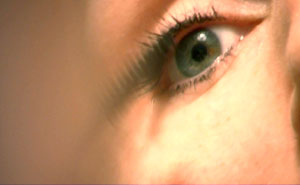 Since 1982, Italian transsexuals have been able to have a sex change operation
that is subsidised according to Section 164 of the law. Those eligible are also
assisted in changing their sexual identity on paper. The condition is that they
subject themselves to a complicated, lengthy and psychologically gruelling
procedure. As a twelve-year-old boy, Nicola de Leo already knew he wanted to
become a woman. Today, the now forty-year-old transsexual lives in Venice and
has changed her name to Nicole. She has undergone hormone treatment and
grown breasts, but she still lives inside the body of a middle-aged man, including
a penis, a beard and a substantial Adam's apple. This is why Nicole is applying
for a sex change through official channels. "I never thought it would be so hard.
I thought making the decision was enough", she says. For five tense years, Nicole
fights her emotional and physical struggle in the presence of director Alberto
Vendemmiati's camera. Working as an actress, a seller of carnival masks and
a prostitute, she finances her cosmetic treatment and looks forward to the
subsidised sex change operation. Meanwhile, she turns for support to her elderly
mother, who has a hard time accepting that her son will soon be a daughter.
Since 1982, Italian transsexuals have been able to have a sex change operation
that is subsidised according to Section 164 of the law. Those eligible are also
assisted in changing their sexual identity on paper. The condition is that they
subject themselves to a complicated, lengthy and psychologically gruelling
procedure. As a twelve-year-old boy, Nicola de Leo already knew he wanted to
become a woman. Today, the now forty-year-old transsexual lives in Venice and
has changed her name to Nicole. She has undergone hormone treatment and
grown breasts, but she still lives inside the body of a middle-aged man, including
a penis, a beard and a substantial Adam's apple. This is why Nicole is applying
for a sex change through official channels. "I never thought it would be so hard.
I thought making the decision was enough", she says. For five tense years, Nicole
fights her emotional and physical struggle in the presence of director Alberto
Vendemmiati's camera. Working as an actress, a seller of carnival masks and
a prostitute, she finances her cosmetic treatment and looks forward to the
subsidised sex change operation. Meanwhile, she turns for support to her elderly
mother, who has a hard time accepting that her son will soon be a daughter.
producers: Gianluca Arcopinto, Andrea Fornari (Zaroff Film), Alberto Vendemmiati
screenplay: Alberto Vendemmiati
camera: Alberto Vendemmiati
editor: Alessio Doglione
music: Aldo Scalzi, Pivio Scalzi
festival info:
Joris Ivens Competition - IDFA, Amsterdam, The Netherlands, 2005 / Silverdocs AFI / DEiscovery Channel Documentary Film Competition, Washington DC, USA, 2006
production info:
Via Luca Della Robbia, 22
153 Rome, Italy
Tel/Fax: + 39 06 57300099
zaroff.film@libero.it
sales info:
Deckert Distribution GmbH
Peterssteinweg 13
Leipzig
04107 Germany
Tel: +49 341 215 6638
Fax: +49 341 215 6639
info@deckert-distribution.com
www.deckert-distribution.com
filmography:
Cadabra, 1996 / Cricifige, 1998 / Le Voci Fuori, 1998 / Jung - In the Land of Mujaheddin, 2000 /
Afghanistan: Collateral Damages, 2002
Pipeline Next Door
Nino Kirtadzé / Un dragon dans les eaux pures du Caucase / France / 2005 / 90 min / Georgian & English
The inhabitants of a remote Georgian village take BP to court. Will pipelines and investors bring a better future or just trouble?
November 10. 20.00, Toldi mozi
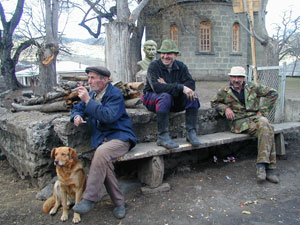 The oil pipeline that is being laid between the Caspian and Mediterranean Seas is
of great geopolitical interest. It will be 1,110 miles long, 155 of which will run
through Georgia, passing Sakiré, a poor village with muddy roads and houses with
flaking paint. Without interviews or voiceover, as an unnoticed bystander, director
Nino Kirtadze films the villagers who, especially in the street, vehemently
discuss this unexpected clash with world politics: the health risks, the governmental
corruption, the possibility of an attack by Bin Laden and especially the level of
financial compensation from BP, the oil company responsible for the pipeline.
Emotions rise higher and higher: the elected village leader storms out of a chaotic
meeting, where the resistance is led by the self-confident and self-appointed Leila.
An equally chaotic court case against BP is lost, but the oil company is getting
nervous too: the filmmakers travel by car with the general manager of BP in
Georgia and attend talks about the villagers' objections. In the end, the general
manager decides to pay a personal visit to the village.
The oil pipeline that is being laid between the Caspian and Mediterranean Seas is
of great geopolitical interest. It will be 1,110 miles long, 155 of which will run
through Georgia, passing Sakiré, a poor village with muddy roads and houses with
flaking paint. Without interviews or voiceover, as an unnoticed bystander, director
Nino Kirtadze films the villagers who, especially in the street, vehemently
discuss this unexpected clash with world politics: the health risks, the governmental
corruption, the possibility of an attack by Bin Laden and especially the level of
financial compensation from BP, the oil company responsible for the pipeline.
Emotions rise higher and higher: the elected village leader storms out of a chaotic
meeting, where the resistance is led by the self-confident and self-appointed Leila.
An equally chaotic court case against BP is lost, but the oil company is getting
nervous too: the filmmakers travel by car with the general manager of BP in
Georgia and attend talks about the villagers' objections. In the end, the general
manager decides to pay a personal visit to the village.
producer: Dominique Tibi
screenplay: Nino Kirtadzé
camera: Jacek Petrycki
editor: Isabel Lorente
sound: Patrick Boland
music: Gio Tsintsadze
festival info:
CPH:DOX Copenhagen International Documentary Film Festival, Denmark, 2005 / Prix Arte, Best Documentary at the European Film Awards, Berlin, Germany, 2005 / 26th Melbourne International Film Festival, Australia, 2006
production info:
ROCHE PRODUCTIONS
Dominique Tibi
45, rue de Louvain
Courbevoie
92400 France
tel: +33 143 340 712
fax: +33 143 340 724
dtibi@rocheproductions.com
sales info:
DOC & CO
13 rue Portefoin
75003 Paris, France
Tel: + 33 1 42775687, Fax: +33 1 427 73656
doc@doc-co.com
www.doc-co.com
filmography:
The Three Lives of Eduard Shevardnadze, 1999 / Chechen
Lullaby, 2000 / Stalin by Stalin, 2002 / Stalin - the funeral
of a god, 2002 / Tell My Friends That I Am Dead, 2003
Prostitution Behind The Veil
Nahid Persson / Prostitution bag sloret / Denmark & Iran & Sweden / 2005 / 58 min / Farsi & Swedish
A portrait of two women from Teheran, their day-to-day life in a country that bans and prosecutes adulterers, sometimes with capital punishment.
November 9. 22.00, Toldi mozi
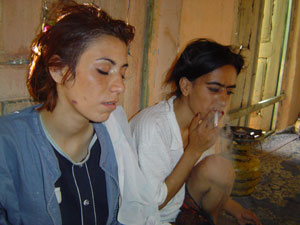 Nahid Persson returns to Iran after living for 17 years in emigration in Sweden.
Coming back as a documentary filmmaker, she originally intends to make a film
about an elderly man, Habib, who sells prophecies on the streets. But when she
visits his run-down house, she is shocked and intrigued to discover that he shares
it with Minna and Fariba, two heroin addicts who prostitute themselves to make
a living and support their little children while both of their husbands are in
prison. The women are neighbours, good friends and support each other. The film
sympathetically explores their everyday life and the way prostitution functions in a
country where adultery is persecuted, sometimes resulting in capital punishment.
For men, there is a "legal" way to buy sex and still comply with Muslim law: they
marry the women in what is called "Sighe", a temporary marriage legal in Shia
Islam. "Sighe" can last from two hours up to 99 years. In the film both Minna
and Fariba undergo "Sighe" with customers and Fariba gets married Sighe-style
to Habib for 6 months. The film follows the women for more than a year, providing
a personal and intimate look into the two tragic lives.
Nahid Persson returns to Iran after living for 17 years in emigration in Sweden.
Coming back as a documentary filmmaker, she originally intends to make a film
about an elderly man, Habib, who sells prophecies on the streets. But when she
visits his run-down house, she is shocked and intrigued to discover that he shares
it with Minna and Fariba, two heroin addicts who prostitute themselves to make
a living and support their little children while both of their husbands are in
prison. The women are neighbours, good friends and support each other. The film
sympathetically explores their everyday life and the way prostitution functions in a
country where adultery is persecuted, sometimes resulting in capital punishment.
For men, there is a "legal" way to buy sex and still comply with Muslim law: they
marry the women in what is called "Sighe", a temporary marriage legal in Shia
Islam. "Sighe" can last from two hours up to 99 years. In the film both Minna
and Fariba undergo "Sighe" with customers and Fariba gets married Sighe-style
to Habib for 6 months. The film follows the women for more than a year, providing
a personal and intimate look into the two tragic lives.
producer: Jacob Hogel
camera: Nahid Persson
editor: Niels Pagh Andersen, Nahid Persson
sound: Biornstad FSFL
music: Ahmad Pejman, "Axiom of Choice"
festival info:
Best Documentary, Audience Award - Creteil, Festival International Films de Femmes, Paris, France, 2005 / The Golden Dragon - Krakow Documentary and Short Film Festival, Poland, 2005 / Audience Award, Prix Association des Femmes Journalistes - Vila Do Conde Festival International De Curtas Metragens, Portugal, 2005 / Best Documentary Short Film - Melbourne Film Festival, Australia, 2005 / Silver Docs Festival, Washington DC, USA, 2005 / Emmy Awards nominee, 2005
production info:
COSMO DOC
Ryesgade 106 A
DK - 2100 Kobenhavn O
Denmark
Tel: +45 35 38 72 00
Fax: +45 35 38 72 99
www.cosmo.dk
sales info:
Det Danske Filminstitut
Gothersgade 55
1123 Kobenhavn K
Tel: +45 3374 3400
Fax +45 3374 3401
dfi@dfi.dkm
filmography:
My Mother - The Persian Princess, 2000 / End of Exile, 2000 / Last Days of Life, 2002 / Me and My Cousin, 2002 / Fuck the Past, 2004
Punam
Lucian Muntean, Natasa Stankovic / Serbia & Rumania / 2005 / 27 min / Nepali & Tamang
One day in the life of a Nepali 9-year-old. Punam cooks, washes, looks after her brothers, then goes to school. And she's one of the lucky ones: 60 percent of Nepali children don't go to school. They break stones or lay bricks instead.
November 9. 18.00, Toldi mozi
November 11. 16.00, Toldi mozi
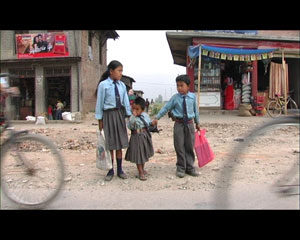 9 year-old Punam Tamang lives in the city of Bhaktapur, Nepal. Punam's mother
died when she was only five. She was left with her father, her two-year-old brother
Krishna and her newborn sister Rabina. The Tamang children see little of their
father because he works from sunrise to sunset in a rice factory, in order to earn
enough money for their school fees. At home Punam assumes the roles of head
of the family, caregiver and homemaker. Among Punam's friends, her family is
still a lucky minority: in Nepal, 60% of children cannot afford to go to school at
all. Many of her playmates had to abandon their studies and games to work in a
stone quarry or brick-making factory to help their families get by. The film captures
the hard work of the children, as well as Punam's dreams and hopes. She
dreams of becoming a teacher and helping other children to study. Currently, one
out of three children in Nepal is a child laborer.
9 year-old Punam Tamang lives in the city of Bhaktapur, Nepal. Punam's mother
died when she was only five. She was left with her father, her two-year-old brother
Krishna and her newborn sister Rabina. The Tamang children see little of their
father because he works from sunrise to sunset in a rice factory, in order to earn
enough money for their school fees. At home Punam assumes the roles of head
of the family, caregiver and homemaker. Among Punam's friends, her family is
still a lucky minority: in Nepal, 60% of children cannot afford to go to school at
all. Many of her playmates had to abandon their studies and games to work in a
stone quarry or brick-making factory to help their families get by. The film captures
the hard work of the children, as well as Punam's dreams and hopes. She
dreams of becoming a teacher and helping other children to study. Currently, one
out of three children in Nepal is a child laborer.
producer: Lucian Muntean, Natasa Stankovic
screenplay: Lucian Muntean, Natasa Stankovic
camera: Lucian Muntean
editor: Natasa Stankovic
sound: Vladimir Moritz
festival info:
Special Award For Cinematography, Special Award for Humanity, Special Award for Artistic Merit - International Film Festival of Slav Countries, Moscow, Russia - 2006 / First Prize - Human Rights International Competition, Audience Award - Shooting Europe, The European Short Film Festival, Karlsruhe, Germany, 2006 / Special Mention - Hamburg Short Film Festival - Mob & Friese Children's Film Festival, Hamburg, Germany, 2006 /The Prize Perspective, UNICEF Moldova - CRONOGRAF International Film Festival of Documentary Film, Chisinau, Moldova, 2006
production and sales info:
Lucian Muntean & Natasa Stankovic
Lasla Gala 34
Novi Sad
21000 Serbia
Tel: +381 214 207 53
Fax: +381 216 367 476
lunaris@eunet.yu
Repatriation
Kim Dong-won / Songhwan / South Korea / 2003 / 149 min / Korean
Captured communist spies and agents provocateur from North Korea walk free after 20-30 years in South Korean prisons. Torture and humiliation have not changed their characters.
November 12. 11.30, Toldi mozi
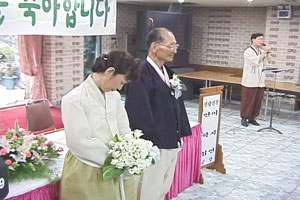 In the spring of 1992, the South Korean film director became acquainted with
two elderly North Korean men after their release from prison. Sent to South Korea
as spies, they were arrested and spent over thirty years in prison, serving out their
sentences without renouncing their communist beliefs. By the end of the 1990s,
relations between North and South Korea had improved somewhat, and even the
most hardened unconverted cases were released. The director's friendship with
the released inmates allowed him to film them for more than a decade. Starting
with questions on the dehumanizing conversion process, the filming evolved into
a record of the diverse reactions towards the ex-spies now living in South Korean
society. In 2000, sixty-three former "unconverted" prisoners were finally repatriated
to the North. When the filmmaker tried to follow them to Pyongyang he was
refused an entrance visa and his communication with this group virtually stopped.
This self-questioning reflection on the possibility of understanding the experiences
and standpoints of others leaves the viewer with a disturbing question to ponder:
can hope for peace and coexistence overcome ideological differences?
In the spring of 1992, the South Korean film director became acquainted with
two elderly North Korean men after their release from prison. Sent to South Korea
as spies, they were arrested and spent over thirty years in prison, serving out their
sentences without renouncing their communist beliefs. By the end of the 1990s,
relations between North and South Korea had improved somewhat, and even the
most hardened unconverted cases were released. The director's friendship with
the released inmates allowed him to film them for more than a decade. Starting
with questions on the dehumanizing conversion process, the filming evolved into
a record of the diverse reactions towards the ex-spies now living in South Korean
society. In 2000, sixty-three former "unconverted" prisoners were finally repatriated
to the North. When the filmmaker tried to follow them to Pyongyang he was
refused an entrance visa and his communication with this group virtually stopped.
This self-questioning reflection on the possibility of understanding the experiences
and standpoints of others leaves the viewer with a disturbing question to ponder:
can hope for peace and coexistence overcome ideological differences?
producer: Kim Dong-won
camera: Kim Tai-il, Jung Chang-young, Chang Young-kil, Oh Jung-hoon, Moon Jung-hyun
editor: Kim Dong-won, Ryu Mi-rye
music: Kim Dong-bum, Lee Ji-eun
festival info:
Yamagata International Documentary Film Festival, Japan, 2003 / Grand Prize, Audience Prize - Seoul Independent 2004 / Freedom of Expression Award - Sundance Film Festival, Park City, USA, 2004 / Amnesty International Film Festival, USA 2004 / New York Human Rights Watch, USA, 2004 / Brisbane International Film Festival, Australia, 2004 / Adelaide Film Festival, Australia, 2005
production info:
P.U.R.N Production
3FL. Chonggang Bldg., 343-5
Sindaebang2-dong, Dongjak-ku
Seoul, 156-012, Korea
Tel: +82 2 823 9124
docukdw@yahoo.co.kr
docukdw@empal.com
sales info:
INDIESTORY Inc.
Gina Kang
4fl. BaekAk Bldg. 135-4
TongIn-dong, JongRoh-gu
Seoul, 110-043, Korea
Tel: +82 2 722 6051
Fax: +82 2 722 6055
indiestory@indiestory.com
www.indiestory.com
filmography:
Sangkeiy-dong Olympics, 1988 / Standing on the Edge of Death, 1990 / In the Forest of Media, 1993 / Haengdang-dong People, 1994 / We'll Be One, 1995 / The 6 Days Struggle at the Myong Dong Cathedral, 1997 / Another World We Are Making, 1999 / One Man, 2001
Runaway
Kim Longinotto, Ziba Mir-Hosseini / UK / 2001 / 85 min / Parsi
A women's shelter in Teheran is a home for abused women and girls. They rebel against their fates - some manage to escape, others have to return home.
November 10. 22.00, Toldi mozi
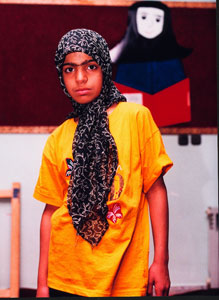 A powerful documentary about a Tehran shelter for girls and young women who
have fled their homes due to domestic discord. While the women who operate the
home provide support for girls from abusive families, they also offer counseling
and try to find out the truth about the situations that have brought the women
to the shelter. The sisterly feelings of the girls towards each other, their spiritual
strength, their courage to rebel, and their wit are shown with a great degree of
compassion and empathy. Yet the primary goal of the counselors is to work
towards family reunification. The girls who have exaggerated the severity of their
problems are sent home - often with mixed feelings of relief and despair.
A powerful documentary about a Tehran shelter for girls and young women who
have fled their homes due to domestic discord. While the women who operate the
home provide support for girls from abusive families, they also offer counseling
and try to find out the truth about the situations that have brought the women
to the shelter. The sisterly feelings of the girls towards each other, their spiritual
strength, their courage to rebel, and their wit are shown with a great degree of
compassion and empathy. Yet the primary goal of the counselors is to work
towards family reunification. The girls who have exaggerated the severity of their
problems are sent home - often with mixed feelings of relief and despair.
screenplay: Kim Longinotto, Ziba Mir-Hosseini
camera: Kim Longinotto
festival info:
Joris Ivans Award Nomination - IDFA, Amsterdam, The Netherlands / Jury Prize for Best Documentary - Philadelphia Festival of World Cinema / Children's Rights Award - Osnabruck Film Festival / Silver Dhow Award - Zanzibar International Film Festival / Chicago International Film Festival / Edinburgh International Film Festival / Margaret Mead Film Festival / Sheffield Documentary Film Festival / Hot Docs Canadian Documentary Film Festival / Munich International Documentary Film Festival / Thessaloniki International Film Festival / New Zealand Film Festival / DocAviv International Film Festival / Thessaloniki Documentary Film Festival / International Festival on Human Rights One World / It's All True Sao Paolo International Documentary Festival / Newport Beach International Film Festival / Seoul Human Rights Film Festival / Seoul Women's Film Festival / Iranian Diaspora Film Festival
The Secret Of My Success
Duan Jinchuan / UK & China / 2002 / 59 min / Mandarin
The birth control committee tracks down an "illegally pregnant" woman. Meanwhile the local government elections take place in a village in Northern China. Never-before seen images of China.
November 11. 14.00, Toldi mozi
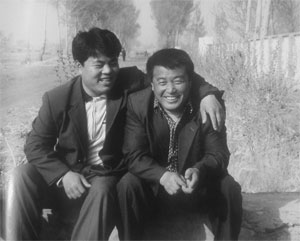 A hilarious insight into the nature of local politics in communist China, where
birth control policy plays an important role in the struggle against overpopulation.
The rural village of Fanshen in northeast China is about to hold its village council
elections, where contraception meets electoral politics. The village was given the
award for "Model Family Planning Village" in 1999. But the Birth Control Officer
Mr. Lu and his colleagues are in danger of losing their jobs when a local woman
who is pregnant with her third child flees the village, seriously violating the community's
annual quota of newborns and jeopardizing the careers of all the village
officials. Ambitious Mr. Lu will stop at nothing to keep his hold on power. The
worried officials form a search party to look for her, while Mr. Lu conspires to fix
the upcoming elections, which ultimately hinge on a question of absentee votes.
Sharply observed details of human behavior and rich, painterly cinematography
lend a fable-like quality to this microcosmic study of fledgling Chinese democracy.
A hilarious insight into the nature of local politics in communist China, where
birth control policy plays an important role in the struggle against overpopulation.
The rural village of Fanshen in northeast China is about to hold its village council
elections, where contraception meets electoral politics. The village was given the
award for "Model Family Planning Village" in 1999. But the Birth Control Officer
Mr. Lu and his colleagues are in danger of losing their jobs when a local woman
who is pregnant with her third child flees the village, seriously violating the community's
annual quota of newborns and jeopardizing the careers of all the village
officials. Ambitious Mr. Lu will stop at nothing to keep his hold on power. The
worried officials form a search party to look for her, while Mr. Lu conspires to fix
the upcoming elections, which ultimately hinge on a question of absentee votes.
Sharply observed details of human behavior and rich, painterly cinematography
lend a fable-like quality to this microcosmic study of fledgling Chinese democracy.
producer: Mark Frith
camera: Jinchuan Duan
editor: Jinchuan Duan
sound: Cheng Min
festival info:
Silver Wolf - IDFA, Amsterdam, 2002 / 5th Thessaloniki
Documentary Film Festival
production info:
Decameron Films Ltd/ACE
Mark Frith
Tel:. +44 (1453) 544 375
dec@dircon.co.uk
sales info:
TV2 WORLD
Sortedam Dossering 55 A
2100 Copenhagen
Denmark
www.tv2world.com
sales@tv2.dk
Tel:. +45 65212223
Fax.: +45 65214199
filmography:
Highand Barley, 1986 / The Sacred Site for Ascetics, 1993
/ The Square, 1995 / Man and Women in Jiada Village,
1997 / The Ends of the Earth, 1997 / No.16 Barkhor South
Street, 1997 / The Sunken National Treasures, 1999 /
The War of Love, 2002
Shinjuku Boys
Kim Longinotto, Jano Williams / UK / 1995 / 53 min / English & Japanese
Girls dressed as boys, entertaining other women in Tokyo. A close-up view of Japanese transvestites.
November 9. 20.00, Toldi mozi
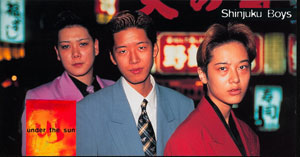 The boys in the title are actually annabes, or cross-dressing Japanese girls, who work as hosts at the New Marilyn club in Tokyo. They are women who live as men and have girlfriends, although they don't usually identify as lesbians. As the film follows them at home and on the job, all three talk frankly to the camera about their gender-bending lives, revealing their views about women, sex, transvestitism and lesbianism. Alternating with these illuminating interviews are fabulous sequences shot inside the club, patronized almost exclusively by heterosexual women who have become disappointed with real men. This is a remarkable documentary about the complexity of female sexuality.
The boys in the title are actually annabes, or cross-dressing Japanese girls, who work as hosts at the New Marilyn club in Tokyo. They are women who live as men and have girlfriends, although they don't usually identify as lesbians. As the film follows them at home and on the job, all three talk frankly to the camera about their gender-bending lives, revealing their views about women, sex, transvestitism and lesbianism. Alternating with these illuminating interviews are fabulous sequences shot inside the club, patronized almost exclusively by heterosexual women who have become disappointed with real men. This is a remarkable documentary about the complexity of female sexuality.
producer: Alan Bookbinder
camera: Kim Longinotto
editor: John Mister
sound: Rosie Straker, Simmy Claire
festival info:
Sydney Lesbian and Gay Film Festival / Honolulu Lesbian and Gay Film Festival / Outstanding Documentary - San Francisco Lesbian and Gay Film Festival / New York Lesbian and Gay Film Festival / London Film Festival / Silver Hugo Award - Chicago Film Festival, Silver Hugo / Gold Prize - Houston Film Festival
filmography:
Pride of Place, with Dorothea Gazidis, 1976 / Theatre Girls, with Claire Pollak, 1978 / Cross and Passion, 1981 / Underage, 1982 / Fireraiser, 1985 / Eat the Kimono, with Claire Hunt, 1989 / Hidden Faces, with Claire Hunt, 1990 / The Good Wife of Tokyo, with Claire Hunt, 1992 / Tragic but Brave, 1993 / Dream Girls, with Jano Williams, 1993 / Shinjuku Boys, with Jano Williams, 1995 / Rock Wives, 1996 / Mike Leigh, 1997 / Divorce Iranian Style, with Ziba Mir-Hosseini, 1998 / Steve and Dave, 1999 / Rob and Chris, 1999 / Gaea Girls, with Jano Williams, 2000 / Runaway, with Ziba Mir-Hosseini, 2001 / The Day I Will Never Forget, 2002 / Sisters in Law, with Florence Ayisi, 2005
The Shutka Book Of Records
Aleksandar Manić / Knjiga Rekorda Shutke / Serbia & Czech Republic & Finland / 2005 / 79 min
Who's the best singer, the oldest man to father a son, the most talented boxer, the best trainer of fighting geese? The BESTs from the world's largest Roma city, in the footsteps of Kusturica in Macedonia.
November 10. 22.00, Toldi mozi
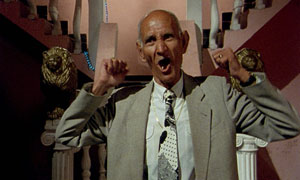 The Roma inhabitants of the Macedonian town of Shutka are poor, but their lives
and their customs are exquisite. Each of the residents believes that he or she is
the champion of a different discipline - protecting the community from evil
spirits, singing, training fighting geese, fashion design, party planning and, of
course, sexual technique. There's the man with the most money, the woman with
the strongest opinions, the guy with the best suits, the greatest lovers, the most
powerful music producer, the best bed maker for circumcisions, the best trainer
of ganders and the best trainer of pigeons, to name but a few. The town boasts
many competitions, including the annual Turkish music cassette contest. In this
little-seen land, vampires are exorcised with fire and pure willpower and popular
songs are composed in ten minutes by the world' s most prolific songwriter.
Severdzan Bajram, an actor known from Emir Kusturica's Black Cat, White Cat,
is our guide on this entertaining tour through the town.
The Roma inhabitants of the Macedonian town of Shutka are poor, but their lives
and their customs are exquisite. Each of the residents believes that he or she is
the champion of a different discipline - protecting the community from evil
spirits, singing, training fighting geese, fashion design, party planning and, of
course, sexual technique. There's the man with the most money, the woman with
the strongest opinions, the guy with the best suits, the greatest lovers, the most
powerful music producer, the best bed maker for circumcisions, the best trainer
of ganders and the best trainer of pigeons, to name but a few. The town boasts
many competitions, including the annual Turkish music cassette contest. In this
little-seen land, vampires are exorcised with fire and pure willpower and popular
songs are composed in ten minutes by the world' s most prolific songwriter.
Severdzan Bajram, an actor known from Emir Kusturica's Black Cat, White Cat,
is our guide on this entertaining tour through the town.
producer: Aleksandar Manić
camera: Dominik Miskovsky
editor: Ivana Davidová
festival info:
FIPRESCI Critic's Award, Golden Audience Award - Serbia and Montenegro Film Festival, Novi Sad, Serbia, 2005 / 15th Philadelphia Film Festival, 2006 / Audience Award - Leeds International Film Festival, UK, 2005 / 26th International Istanbul Film Festival, Turkey, 2006
production info:
CABIRIA LTD
Na Petynce 96
Prague, 169 00 Czech Republic
Tel: +42 224 313 586
Fax: +42 224 319 080
info@cabiriafilms.com
www.cabiriafilms.com
sales info:
TASKOVSKI FILMS LTD
4B Wentworth Street
London
E1 7TF U.K.
Tel/Fax: +44 207 247 0238
info@taskovskifilms.com
filmography:
Shooting Days: Emir Kusturica Directs Underground, 1996 / Kosovské zdi, 1998 / The Orphans of Enver Hoxha, 1999, (TV) / Doger - the Serbian Revolution, 2000
Sisters In Law
Kim Longinotto, Florence Ayisi / UK / 2005 / 106 min /English & Pidgin English
In Cameroon both tribal and customary law are against women. A female prosecutor and a female judge, stand up for modern law and women's rights.
November 11. 18.00, Toldi mozi
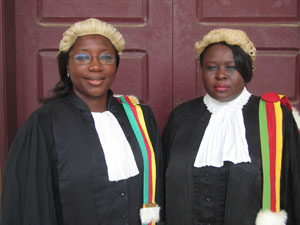 In the little town of Kumba, Cameroon, there have been no convictions in spousal
abuse cases for 17 years. But two women determined to change their community
are making progress that could change the world. This fascinating and often hilarious
film follows the work of State Prosecutor Vera Ngassa and Court President
Beatrice Ntuba as they help women fight often difficult cases of abuse, despite
pressure from their family and community to remain silent. Six-year-old Manka is
covered in scars and has run away from an abusive aunt, Amina is seeking a
divorce to put an end to brutal beatings by her husband, the preteen Sonita has
daringly accused her neighbor of rape. The documentary follows the "sisters in
law" as they nourish grass-roots feminism in a Cameroon village. Winner of the
Prix Art et Essai at the Cannes Film Festival and screened to acclaim at more
than 90 festivals around the world, it is Kim Longinotto's latest documentary.
In the little town of Kumba, Cameroon, there have been no convictions in spousal
abuse cases for 17 years. But two women determined to change their community
are making progress that could change the world. This fascinating and often hilarious
film follows the work of State Prosecutor Vera Ngassa and Court President
Beatrice Ntuba as they help women fight often difficult cases of abuse, despite
pressure from their family and community to remain silent. Six-year-old Manka is
covered in scars and has run away from an abusive aunt, Amina is seeking a
divorce to put an end to brutal beatings by her husband, the preteen Sonita has
daringly accused her neighbor of rape. The documentary follows the "sisters in
law" as they nourish grass-roots feminism in a Cameroon village. Winner of the
Prix Art et Essai at the Cannes Film Festival and screened to acclaim at more
than 90 festivals around the world, it is Kim Longinotto's latest documentary.
producer: Kim Longinotto
executive producer: Peter Dale
camera: Kim Longinotto
editor: Ollie Huddleston
sound: Mary Milton
sound: D'Gary
festival info:
Special Documentary Prize - Munich Documentary Film Festival / Audience Award - Commonwealth Film Festival / Jury Prize - Human Rights Nights Film Festival, Italy / Best International Film - The Tel-Aviv International Documentary Film Festival / 1st Maysles Award - Belfast Film Festival / Silver Award - Al-Jazeera TV Festival / Best Doc Nominee - British Independent Film Awards /Basil Wright Award - RAI Film Festival, Oxford / Social Justice Award - Santa Barbara Film Festival / Audience Award - Royal Anthropological Institute Film Festival / Audience Award - IDFA, Amsterdam, the Netherlands / Best Documentary - Hawaii International Film Festival / Special Mention Europa Cinemas - Cannes Film Festival / Prix Art et Essai - Cannes Film Festival
Source
Martin Mareček, Martin Skalský / Zdroj / Czech Republic / 2005 / 75 min / Czech & Russian & English & Azerbaijani
Baku in Azerbaijan is one of the world's richest sources of oil. A new Kuwait? Cows lapping up oil puddles and corrupt party secretaries on the post-Soviet sand.
November 12. 14.00, Toldi mozi
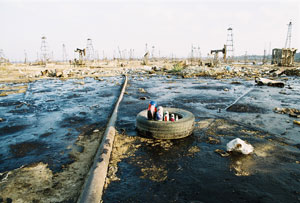 Baku in Azerbaijan, with some of the richest deposits of oil in the world, is
becoming a focus for foreign investors eager to take advantage of the country's
natural resources. Source traces the "Great Oil Road" from European highways
to this surreal and sinister landscape, where cows graze on polluted land and
children play in toxic gunge. With three quarters of the population living under
the poverty line, the country's post-Soviet government is promising that oil will
turn Azerbaijan into a prosperous and flourishing "New Kuwait". But between
big oil companies like British Petroleum and the corrupt government lining their
pockets, what does this mean for the ordinary people of Azerbaijan? Is this
"liquid gold" more of a curse or a blessing for the country?
Baku in Azerbaijan, with some of the richest deposits of oil in the world, is
becoming a focus for foreign investors eager to take advantage of the country's
natural resources. Source traces the "Great Oil Road" from European highways
to this surreal and sinister landscape, where cows graze on polluted land and
children play in toxic gunge. With three quarters of the population living under
the poverty line, the country's post-Soviet government is promising that oil will
turn Azerbaijan into a prosperous and flourishing "New Kuwait". But between
big oil companies like British Petroleum and the corrupt government lining their
pockets, what does this mean for the ordinary people of Azerbaijan? Is this
"liquid gold" more of a curse or a blessing for the country?
producer: Vratislav Šlajer
screenplay: Martin Mareček, Martin Skalský
camera: Jiří Málek
editor: Martin Mareček
festival info:
The Plzeňský Prazdroj Audience Award - One World International Human Rights Documentary Film Festival, Prague, Czech Republic, 2005 / The Grand Prix - EKOFILM, Cesky Krumlov, Czech Republic, 2005 / Audience Award, Best Czech Doc. Film - Jihlava International Documentary Film Festival, 2005 / The Grand Prize and the Trophy, Public Sympathy Prize - CRONOGRAF International Festival of Documentary Film, Chisinau, Moldova, 2005 / Human Rights Watch International Film Festival, New York, USA, 2006 / Leeds International Film Festival, UK, 2006
production info:
Bionaut Films
U Zvonařky 14
Praha 2 - 120 00
Czech Republic
Tel/Fax: + 420 222 517908
bionaut@bionaut.cz
www.bionaut.cz
sales info:
Taskovski Films
4b Wentworth Street
London E1 7TF
Tel: +44 207 930 572866
taskovskifilms@yahoo.co.uk
www.taskovskyfilms.com
filmography:
Maple Tree 98, 1998 / Egg Methods, 1999 / Dust Games, 2001
Stork Story
György Dobray / Hungary / 2005 / 56 min / Hungarian
One woman waited endlessly for a baby - in vain. The other didn't want her third and would sooner be rid of it. Will they find each other? A story about open adoption in Hungary.
November 9. 16.00, Toldi mozi
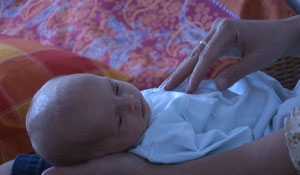 Open adoption means that the biological mother does not want to or cannot bring
up her unborn child, whom she entrusts to the care of adoptive parents whom
she herself knows and accepts. This film is about the sometimes shocking and
dramatic process of open adoption. The waiting, the nerve-racking and joyful
minutes, hours and weeks of preparation, the tribulations of the adopting family.
And of course the struggle the mother goes through whether she should give up
altogether, and whether she is capable of giving up what is the most sacred for
every parent: their own child. The participants in open adoption are not enemies.
They are simply mothers who make a decision in order to protect the child.
Open adoption means that the biological mother does not want to or cannot bring
up her unborn child, whom she entrusts to the care of adoptive parents whom
she herself knows and accepts. This film is about the sometimes shocking and
dramatic process of open adoption. The waiting, the nerve-racking and joyful
minutes, hours and weeks of preparation, the tribulations of the adopting family.
And of course the struggle the mother goes through whether she should give up
altogether, and whether she is capable of giving up what is the most sacred for
every parent: their own child. The participants in open adoption are not enemies.
They are simply mothers who make a decision in order to protect the child.
producer: Zsuzsanna G. Hollósi, Gábor Varga, György Dobray
camera: Tamás Andor, György Dobray
music: Elemér Balázs
editor: Gábor Marinkás
sound: András Vámosi
production company: Filmplus Kft.
production info:
Filmplus Kft.
Tel.: + 36 1 460 80 60
György Dobray
Tel.: + 36 1 2125872
brekeke@t-online.hu
gyorgy2000@t-online.hu
filmography:
Az áldozat, 1979 / Vérszerzôdés, 1982 / Szerelem elsô vérig, 1985 / Szerelem második vérig, 1987 /
A mi ügyünk I-II., 1988 / Szálka hal nélkül I-VI., TV sorozat, 1988 / K1 - Film a prostituáltakról, 1989 /
K2 - Az éjszakai lányok, 1990 / Szerelmes szívek, 1992 / Radioaktív BUÉK, 1995 /
Szerelem utolsó vérig, 2001
The Swenkas
Jeppe Ronde / South Africa & Denmark / 2004 / 72 min / English & Zulu
South Africa, Johannesburg. Manual laborers on weekdays, fashion maniacs at weekends: Zulu men dress up, let rip for Saturday night fever.
November 11. 12.00, Toldi mozi
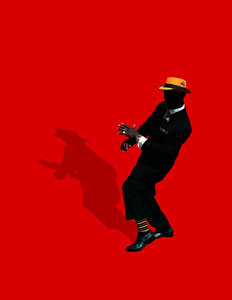 The Swenkas are Zulu men who are entertainingly profiled in this inventive and
beautifully understated documentary. Every Saturday night, a group of laborers
from Johannesburg transform themselves into the best-dressed men in South
Africa. They take great pride in putting on flashy suits and stand out as an
inspiration for others, leaving their grimy overalls behind and wearing their best
Carducci or Pierre Cardin creations to impress the weekly selected judge with
sultry steps and graceful arm gestures. They are a close-knit set of men who
consider respect, tidiness and virtue of paramount importance. The film follows
an elder known as "Mr Dangerous" who takes a young man, Sabelo, under his
wing. Sabelo's father, once a leading Swenka, has recently died and the
emotional support he receives demonstrates a phenomenon which runs much
deeper than an unusual fashion show. Their tale is told by an elderly Zulu man,
who builds his fictitious story around real characters.
The Swenkas are Zulu men who are entertainingly profiled in this inventive and
beautifully understated documentary. Every Saturday night, a group of laborers
from Johannesburg transform themselves into the best-dressed men in South
Africa. They take great pride in putting on flashy suits and stand out as an
inspiration for others, leaving their grimy overalls behind and wearing their best
Carducci or Pierre Cardin creations to impress the weekly selected judge with
sultry steps and graceful arm gestures. They are a close-knit set of men who
consider respect, tidiness and virtue of paramount importance. The film follows
an elder known as "Mr Dangerous" who takes a young man, Sabelo, under his
wing. Sabelo's father, once a leading Swenka, has recently died and the
emotional support he receives demonstrates a phenomenon which runs much
deeper than an unusual fashion show. Their tale is told by an elderly Zulu man,
who builds his fictitious story around real characters.
producers: Rasmus Thorsen, Anne Diemer
screenplay: Kim Leona, Jeppe Ronde
camera: Lars Skree, Sebastian Wintero, Nic Hofmeyer
editor: Olivier Bugge Coutté
music: Povl Kristian
festival info:
Special Jury Prize for Direction - Toronto Hot Docs International Documentary Festival, Canada, 2005 / Special Mention - Odense IFF, Denmark, 2005 / Gold Dok Best Cinematography, Gold Dok of the Year - CPH Dox Copenhagen Documentary Festival, Denmark, 2005 /Nominated, Prix Arte - Berlin European Film Academy Awards, Germany, 2005 / 23rd Annual Minneapolis - St. Paul International Film Festival, USA, 2005 / Leeds International Film Festival, UK, 2005 / Melbourne International Film Festival, Australia, 2005
production info:
Cosmo Film
Ryesgade 106 A
2100 Copenhagen, Denmark
Tel: + 45 35 387 200
Fax: + 45 35 387 299
sales info:
First Hand Films
Schaffhauserstrasse 359
CH - 8050 Zürich, Switzerland
Tel: +41 1 312 20 60
Fax: +41 1 312 20 80
info@firsthandfilms.com
www.firsthandfilms.com
filmography:
Dancing in The Midst of War, 2000 / Son, 2001 /
Jerusalem, My Love, 2003
Tarifa Traffic: Death In the Straits Of Gibraltar
Joakim Demmer / Germany & Switzerland / 2003 / 60 min / Spanish
Hundreds and thousands of illegal immigrants come ashore on the beaches of Tarifa, in the deep south of Spain, from Morocco - alive or dead.
November 10. 16.00, Toldi mozi
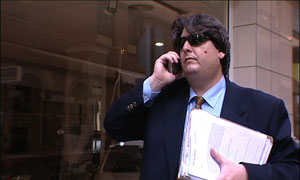 Tarifa, a city in the south of Spain, is considered one of Europe's best beaches
for surfing. Early in the morning, the wind-surfers sail across the clear blue sea
and the first tourists are taking their places in the deck chairs. Just a few steps
away dead bodies are being tossed up on the shore by crashing waves. They
come when the moon is full and the sea is smooth, filled to the gunwales with
ever-more people from Morocco and sub-Saharan Africa. Many cannot swim
and have nothing except the clothes on their backs. And it doesn't take much
for an overcrowded boat to capsize or sink, leading to a catastrophe. From
a European perspective and with haunting images, the film takes a look at the
people of Tarifa whose everyday life is influenced by the constant flow of illegal
immigrants, searching for a better future in "fortress Europe".
Tarifa, a city in the south of Spain, is considered one of Europe's best beaches
for surfing. Early in the morning, the wind-surfers sail across the clear blue sea
and the first tourists are taking their places in the deck chairs. Just a few steps
away dead bodies are being tossed up on the shore by crashing waves. They
come when the moon is full and the sea is smooth, filled to the gunwales with
ever-more people from Morocco and sub-Saharan Africa. Many cannot swim
and have nothing except the clothes on their backs. And it doesn't take much
for an overcrowded boat to capsize or sink, leading to a catastrophe. From
a European perspective and with haunting images, the film takes a look at the
people of Tarifa whose everyday life is influenced by the constant flow of illegal
immigrants, searching for a better future in "fortress Europe".
producers: Samir, Valentin Greutert
screenplay: Joakim Demmer
camera: Hoyte van Hoytema
editor: Joakim Demmer, Natalie Barrey
music: Matthias Trippner, Mogwai
festival info:
SwissAmerican Film Festival, New York, USA, 2004 / Revelation Film Festival, Fremantle, Australia, 2004 / Rencontres Internationales du Documentaire de Montreal, Canada, 2004 / The 8th Ismailia International Film Festival, Egypt, 2004 / Shoot Me Film Festival, Hague, the Netherlands, 2005
production info:
CH Dschoint Ventschr Filmproduktion AG
Zentralstrasse 156, CH-8003
Zürich, Switzerland
Tel: +41 1 456 30 20
Fax: +41 1 456 30 25
dvfilm@dschointventschr.ch
www.dschointventschr.ch
sales info:
Deutsche Film- und Fernsehakademie Berlin GmbH (dffb)
Jana Wolff
German Film & Television Academy (dffb)
Potsdamer Strasse 2
10785 Berlin, Germany
Tel: +49 30 2575 9152
Fax: +49 30 25 759162
wolff@dffb.de
www.dffb.de
filmography:
Flieger, 1998 / Kita, 1999 / Vergehen, 1999 / Unborn, 2000 / Play-Off, 2001 /
Zehn Argumente Gegen Gelb, 2002
Terminus
Gábor Péter Németh / Hungary / 2005 / 38 min / Hungarian & Serbian
Ten years after the war ended in the former Yugoslavia 25 Bosnian refugees still live in the Debrecen refugee camp. The one-time inmates of a mental hospital in Bosnia-Herzegovina are longing to go home.
November 11. 14.00, Toldi mozi
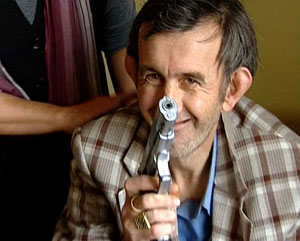 Bosnia 2005. Ten years have passed since the Dayton Peace Agreement, which
brought the war to an end, but more than a million Bosnians are still waiting to
return to their former homes. Among them are the last ethnic Bosnian refugees
in Hungary, who in 1992 were freed from the institute for the mentally ill in
Jakes, which was located right on the front line of the war. "Since then my life
has collapsed like a house of cards", says Pandur, the self-appointed leader of
a group of 28 people from Jakes. "Since I came here my life has become hell.
Really. Not just for me but for everybody. We are locked in all day and are only
let out for breakfast and dinner." For the inhabitants of this refugee camp for
the mentally handicapped in Debrecen life passes in bleak boredom. The inactivity
and monotony of the days kills their lust for life and these people, who are
abandoned to their fate, are slowly giving up hope that they will ever return
home.
Bosnia 2005. Ten years have passed since the Dayton Peace Agreement, which
brought the war to an end, but more than a million Bosnians are still waiting to
return to their former homes. Among them are the last ethnic Bosnian refugees
in Hungary, who in 1992 were freed from the institute for the mentally ill in
Jakes, which was located right on the front line of the war. "Since then my life
has collapsed like a house of cards", says Pandur, the self-appointed leader of
a group of 28 people from Jakes. "Since I came here my life has become hell.
Really. Not just for me but for everybody. We are locked in all day and are only
let out for breakfast and dinner." For the inhabitants of this refugee camp for
the mentally handicapped in Debrecen life passes in bleak boredom. The inactivity
and monotony of the days kills their lust for life and these people, who are
abandoned to their fate, are slowly giving up hope that they will ever return
home.
producer: Gábor Péter Németh
camera: Gábor Horkai, Viktor Németh, Ákos Gulyás
music: Szabolcs Szőke
editor: Bori Kriza, Balázs Féjja
production info:
Metaforum Film
Hungary
Balázs Wízner
Október 6. utca 3
Budapest
1051 Hungary
Tel: +3601 411 1245
Fax: +3601 411 1244
+ 36 30 250 20 54 (cell)
wizner@socio.mta.hu
filmography:
Édes otthon, 1999 / Ki tud többet Kádár Jánosról
- Vetélkedô Kazincbarcikán, 2000 / Másik Magyar
Válogatott, 2001 / Világbajnok, 2002
/ Elszakítva, 2002 / Gyertyaláng, 2003 / A Fekete portré
Fekete János bankárról, 2004
This Happy Life
Juang Yue / UK & China / 2002 / 59 min / Mandarin
Zhengzhou, the busiest railway station in China. Through the crowd light is shed on the remarkable fates of two men working at the terminus.
November 10. 18.00, Toldi mozi
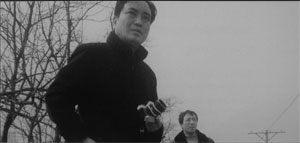 An atmospheric film about Zhengzhou, China's busiest train station, and two of
it its employees - Mr. Fu and Mr. Liu. "People with children, climb through the
windows" is not an unusual instruction from Zhengzhou station staff, especially
on the eve of Chinese New Year when 1.2 million people are all trying to get
home. Mr. Fu is Party Secretary and responsible for the political education of
the station staff, and Mr. Liu, Head of Passenger Affairs. Both of them are
filmed working at this hectic station and at home with their families. Film-maker
Jiang Yue goes deep into the souls of these two men, and reveals their inner
lives. Mr. Fu confesses being in an unhappy marriage and still mourns for his
first wife, the mother of his child, who died during an abortion. He is very upset
when his darling son leaves home to join the army. Mr. Fu's colleague Mr. Liu
also has problems but of a different nature. The financial pressures after buying
a new luxury home weigh heavily on him; he and his wife are facing redundancy,
and school fees for their child are unexpectedly expensive. This film offers an
eye-opening glimpse of life in contemporary China through the everyday course
of events at Zhengzhou station, where giving away a found baby to a fruit vendor
and the murder of a passenger by a psychopath are just part of the daily routine.
An atmospheric film about Zhengzhou, China's busiest train station, and two of
it its employees - Mr. Fu and Mr. Liu. "People with children, climb through the
windows" is not an unusual instruction from Zhengzhou station staff, especially
on the eve of Chinese New Year when 1.2 million people are all trying to get
home. Mr. Fu is Party Secretary and responsible for the political education of
the station staff, and Mr. Liu, Head of Passenger Affairs. Both of them are
filmed working at this hectic station and at home with their families. Film-maker
Jiang Yue goes deep into the souls of these two men, and reveals their inner
lives. Mr. Fu confesses being in an unhappy marriage and still mourns for his
first wife, the mother of his child, who died during an abortion. He is very upset
when his darling son leaves home to join the army. Mr. Fu's colleague Mr. Liu
also has problems but of a different nature. The financial pressures after buying
a new luxury home weigh heavily on him; he and his wife are facing redundancy,
and school fees for their child are unexpectedly expensive. This film offers an
eye-opening glimpse of life in contemporary China through the everyday course
of events at Zhengzhou station, where giving away a found baby to a fruit vendor
and the murder of a passenger by a psychopath are just part of the daily routine.
producer: Juang Yue, Mark Frith
camera: Yue Jiang
editor: Yue Jiang
sound: Chen Min
festival info:
IDFA, 2002 / 22nd International Documentary Film Festival, Munich, 2003
production info:
Decameron Films
29 Tradescent Road
London, SW8 1XD UK
Tel: +44 (1453) 544 375
dec@dircon.co.uk
sales info:
TV2 WORLD
Sortedam Dossering 55 A
2100 Copenhagen,Denmark
Tel.: +45 65212223
Fax.: +45 65214199
www.tv2world.com
sales@tv2.dk
filmography:
Bakhor, 1992 / Catholics in Tibet, 1992 / The Other Bank, 1995 / The War of Love, 2002
Vierka, Or The Mystery Of Family B.'s Disappearance
Miroslav Janek / Vierka aneb záhada zmizení rodiny B . / Czech Republic / 2005 / 76 mins / Czech
Ida Kelerova, the famous Czech Roma singer, decides to take a promising Roma girl from Slovakia under her wing. So why does the girl vanish?
November 9. 18.00, Toldi mozi
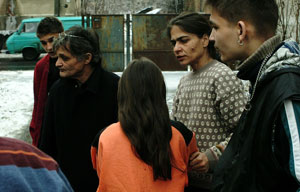 This documentary, which started out as a portrait of Vierka, a talented young
Roma singer, suddenly turns into a drama about two different views of "the
truth". The story begins with an encounter between well-known Roma singer
Ida Kelarová, living in the Czech Republic, and Vierka Berkyová from Lucˇenec,
Slovakia, whose musical talent astonishes everyone who hears her sing. When
Ida decides to help the young talent, a new period begins in the life of the Berky
family. The idea of coexistence was originally envisioned as an idyll in which two
families would share a home with all its attendant joys and cares. But one day
the Berkys suddenly disappear without trace. For director and cameraman
Miroslav Janek, the documentary changes into a drama with two differing versions
of the truth - each one keenly and passionately experienced. The director
searches to uncover the hidden, partly unacknowledged and partly incompatible,
ideas about the meaning of life and visions of success and the future.
This documentary, which started out as a portrait of Vierka, a talented young
Roma singer, suddenly turns into a drama about two different views of "the
truth". The story begins with an encounter between well-known Roma singer
Ida Kelarová, living in the Czech Republic, and Vierka Berkyová from Lucˇenec,
Slovakia, whose musical talent astonishes everyone who hears her sing. When
Ida decides to help the young talent, a new period begins in the life of the Berky
family. The idea of coexistence was originally envisioned as an idyll in which two
families would share a home with all its attendant joys and cares. But one day
the Berkys suddenly disappear without trace. For director and cameraman
Miroslav Janek, the documentary changes into a drama with two differing versions
of the truth - each one keenly and passionately experienced. The director
searches to uncover the hidden, partly unacknowledged and partly incompatible,
ideas about the meaning of life and visions of success and the future.
producer: Richard Němec
screenplay: Miroslav Janek
camera: Miroslav Janek
music: traditional and contemporary Romany music
festival info:
Best Czech Document Award - 9th International Documentary Festival in Jihlava, Czech Republic, 2005 / Honorary Mention - One World, 8th International Human Rights Documentary Festival, Prague, Czech Republic, 2006 / Cracow Film Festival, Poland, 2006
production and sales info:
VERBASCUM
Černá 6
110 00 Prague, Czech Republic
Tel: + 420 224 930 077
Fax: + 420 224 930 384
verbascum@email.cz
www.verbascum.cz
filmography:
Visitor, 1983 / Heroes, 1983 / The Caprices of Marianne,
1983 / Little City in Space, 1984 / The Fantastic
Adventures of the Count of St. Germain, 1984 / U Film
Society, 1985 / Kippers, 1988 / Now I Lay Me, 1988 /
Seven Ten Nectiny, 1993 / On Kralik And the Guests, 1995
/ Paradise On Earth, 1996 / The Unseen, 1996 / Opera
Baroque, 1997 / The Last Slav, 1997 / Who Is Jiri Kralik,
1997 / Hamsa, 1998 / Previanti, 1998 / Man and His
Master, 1999 / Battle For Life, 2000 / Crimson Sails, 2001
/ Romeo and Juliette, 2003 / Beauty and the Beast, 2003 /
The Second Memory, 2003 / Peace to Their Souls, 2004 /
Kha-Chee-Pae 2005
Vukovar - Final Cut
Janko Baljak / Vukovar - poslednji rez / Serbia / 2006 / 103 min / Serbian & Croatian
What caused the tragedy of Vukovar in Slavonia, once the model Yugoslav town? A joint project by Serbian and Croatian filmmakers reveals the truth.
November 11. 14.00, Toldi mozi
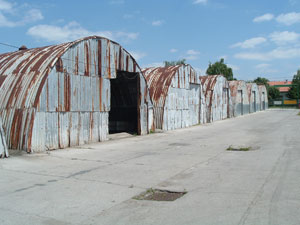 A painstaking investigation into the history of the 1991 Vukovar tragedy. Why was
it that Vukovar, a rich Slavonian town famous as a "miniature Yugoslavia", Tito's
exemplary town of unity, was the one location to suffer total apocalypse, comparable
to the sacrifice and siege of Stalingrad, and by the extent of destruction,
and scenes shown around the world, reminiscent of Hiroshima and Nagasaki? Why
was a city which had neither strategic importance nor a strong military presence
in the conflict between the Yugoslav National Army and the Croatian military, so
systematically destroyed while the Serbian (Milosˇ evic´) and Croatian (Tudjman)
leaders walked around Tito's estate, discussing plans for a new division of Yugoslavia?
With the help of the survivors and available archives, a Serbian director
and a Croatian journalist put together the pieces of this impossible mosaic. This
film is neither a Serbian documentary nor a Croatian one. It is the first Serbian-
Croatian co-production about this painful topic, whose wounds have yet
to heal, even after a lapse of fifteen years.
A painstaking investigation into the history of the 1991 Vukovar tragedy. Why was
it that Vukovar, a rich Slavonian town famous as a "miniature Yugoslavia", Tito's
exemplary town of unity, was the one location to suffer total apocalypse, comparable
to the sacrifice and siege of Stalingrad, and by the extent of destruction,
and scenes shown around the world, reminiscent of Hiroshima and Nagasaki? Why
was a city which had neither strategic importance nor a strong military presence
in the conflict between the Yugoslav National Army and the Croatian military, so
systematically destroyed while the Serbian (Milosˇ evic´) and Croatian (Tudjman)
leaders walked around Tito's estate, discussing plans for a new division of Yugoslavia?
With the help of the survivors and available archives, a Serbian director
and a Croatian journalist put together the pieces of this impossible mosaic. This
film is neither a Serbian documentary nor a Croatian one. It is the first Serbian-
Croatian co-production about this painful topic, whose wounds have yet
to heal, even after a lapse of fifteen years.
producers: Veran Matic, Vanja Kranjac
screenplay: Janko Baljak, Drago Hedl
camera: Jovan Milinov
editor: Aleksandra Milovanovic
sound: Igor Perovic
music: Janja Loncar
festival info:
Human Rights Award - 12th Sarajevo Film Festival, Bosnia and Herzegovina, 2006 / Belgrade Film Festival, Serbia, 2006 / Zagreb Documentary Film Festival, Croatia, 2006 / FilmFest München, Germany, 2006
production and sales info:
TV B92, Boulevard Annoj - a 64
11070 Belgrade, Serbia
Tel: + 381 11 301 2000 ext.3288
Fax: +381 11 301 2001
Ana.gruden@b92.net
www.b92.net
filmography:
Once Upon a Time in Serbia, 1991 / Eco Aqua di
Montenegro, 1993 / Images of Sad Events, 1993 / Extreme
Belgrade, 1993 / All the President's News, 1994 / Kosovo
Trilogy, 1994 / Belgrade Radio Bridegroom, 1994 / The
Crime that Changed Serbia, 1995 / Ethnically Clean, 1998 /
Tobacco Road, 1998 / Anatomy of Pain, 2000 / The Dead Kill
- Anatomy of Pain 2, 2001 / Serbia in Garbage Can, 2002
White Terror
Daniel Schweizer / Switzerland & France & Germany / 2005 / 90 min / English & French & German
Trailers, spots and promotional materials available for free or for sale. Neo-Nazis from the United States through Germany, Switzerland or Sweden use the internet to spread racist ideas today.
November 10. 20.00, Toldi mozi
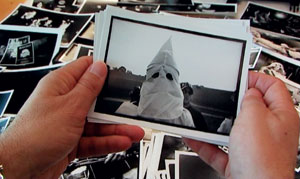 Over the past five years, new ideologists of radical far-right extremism have emerged all over Europe, North America and Russia. They do not necessarily shave their heads; they have created corporations, distribution companies, music clubs, magazines, publishing houses, internet sites and they have replaced the old symbols with new ones. With globalization taking a firmer hold and with clear demarcation lines blurring, the hate-mongers are rekindling the fires of the past, blowing on their glowing ashes. In this era of new technologies, the United States and Sweden have been deeply shocked to find their youth roused to racist violence, which has since contaminated the whole of the Western world as well as Russia and its neighbouring countries. For young Neo-nazis the past is virtual history where real cannot be distinguished from fake; their version of the future looks bleak and threatening. Daniel Schweizer investigates the forces that hide behind the 'White Power' and the 'New Racists' slogans.
Over the past five years, new ideologists of radical far-right extremism have emerged all over Europe, North America and Russia. They do not necessarily shave their heads; they have created corporations, distribution companies, music clubs, magazines, publishing houses, internet sites and they have replaced the old symbols with new ones. With globalization taking a firmer hold and with clear demarcation lines blurring, the hate-mongers are rekindling the fires of the past, blowing on their glowing ashes. In this era of new technologies, the United States and Sweden have been deeply shocked to find their youth roused to racist violence, which has since contaminated the whole of the Western world as well as Russia and its neighbouring countries. For young Neo-nazis the past is virtual history where real cannot be distinguished from fake; their version of the future looks bleak and threatening. Daniel Schweizer investigates the forces that hide behind the 'White Power' and the 'New Racists' slogans.
producer: Samir
screenplay: Daniel Schweizer
camera: Piotr Jaxa
editor: Kathrin Plüss
music: Tapani Rinne
festival info:
Sevilla Festival de Cine, Spain, 2005 / Locarno International Film Festival, Switzerland, 2005 / One World 8th International Human Rights Documentary Film Festival, Prague, Czech Republic, 2006
production info:
Dschoint Ventschr Filmproduktion
Zentralstrasse 156
Zurich
8003 Switzerland
tel: +41 145 630 20
fax: +41 145 630 25
office@dschointventschr.ch
www.dschointventschr.ch
www.whiteterror.com
sales info:
WIDE MANAGEMENT
Loic Magneron
42 bis, rue de Lourmel
Paris
75015 France
tel: +33 153 950 464
fax: +33 153 950 465
wide@widemanagement.com
www.widemanagement.com
filmography:
Various experimentals, 1980 / Derneir Amour, 1988 / Vivre avec, 1993 / Sylvie, 1995 / Skin or Die, 1998 / Helldorado, 2000 / Skinhead Attitude, 2003
